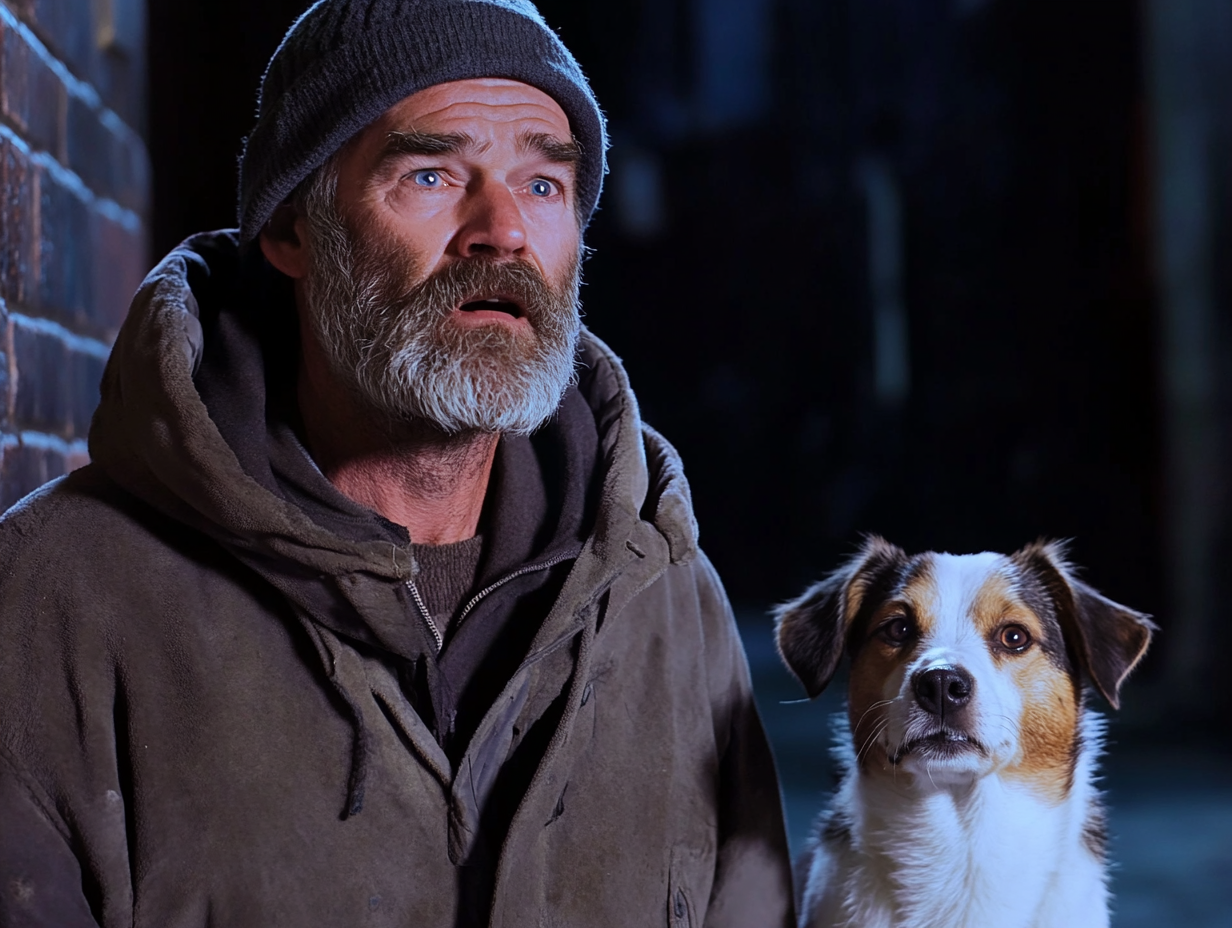Joshua was asleep when a scream tore through the silence, sharp and panicked. His eyes flew open. Lucky jerked upright beside him, ears perked. Joshua blinked into the dark, adrenaline flooding him fast. That hadn’t sounded like a drunk shouting or a couple arguing. That sounded like danger.
He got up quickly, grabbed his bag, and crouched low. “Quiet,” he whispered to Lucky, holding a finger up. Lucky stilled, alert and tense. Another voice echoed faintly—muffled, male, aggressive. Joshua squinted toward the alley across the street. It was dark. Too dark. But something was happening there.
He crossed carefully, every step quiet against the damp pavement. Lucky padded beside him, silent and sharp-eyed. Joshua edged up to a dumpster near the alley mouth and peered around. What he saw next made his blood turn cold…..
Joshua crouched behind the café, sifting through trash bags with numb fingers. The smell hit hard—old meat, spoiled sauce—but he didn’t flinch. He knew what to look for. Lucky sat close, tail wagging, watching every move like a hawk. His hope made Joshua move faster.
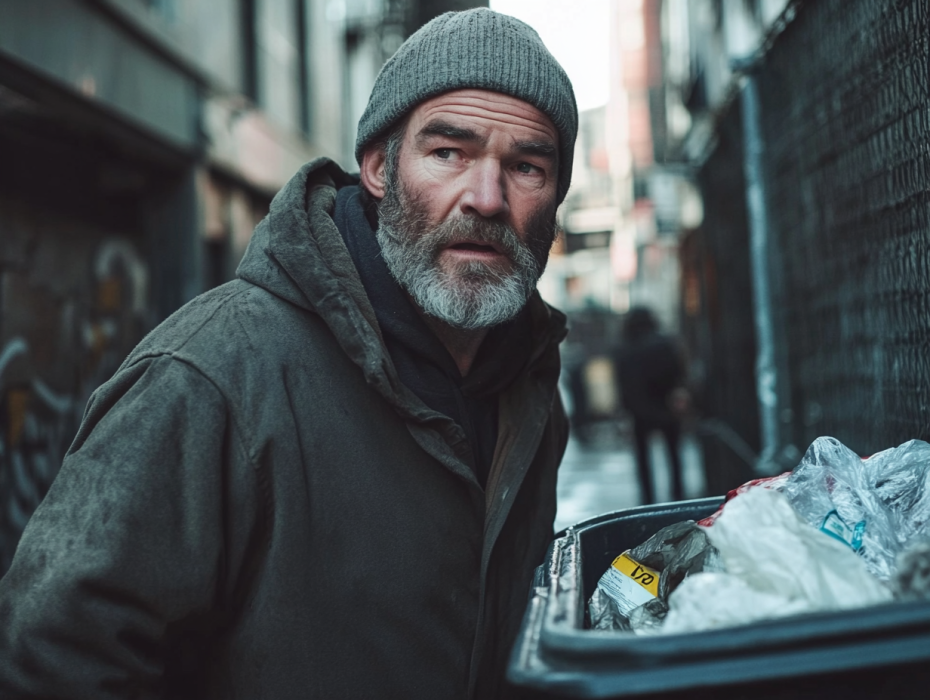
Joshua never thought he’d end up here. He used to have a family, a home, and a job he loved. Then a car accident—a life-changing one—took everything. He lost his wife, his sense of security, and eventually, his ability to keep a roof over his head. The world had kept moving on while he stood still, paralyzed by grief. Now, years later, it was just him and Lucky, scraping by.
He found a crumpled paper bag with half a sandwich inside. Bread soaked through, meat dried out, but still food. He checked for mold, ready to share. But the back door slammed open. The manager stepped out, scowling, already reaching for his phone. Joshua didn’t wait around.
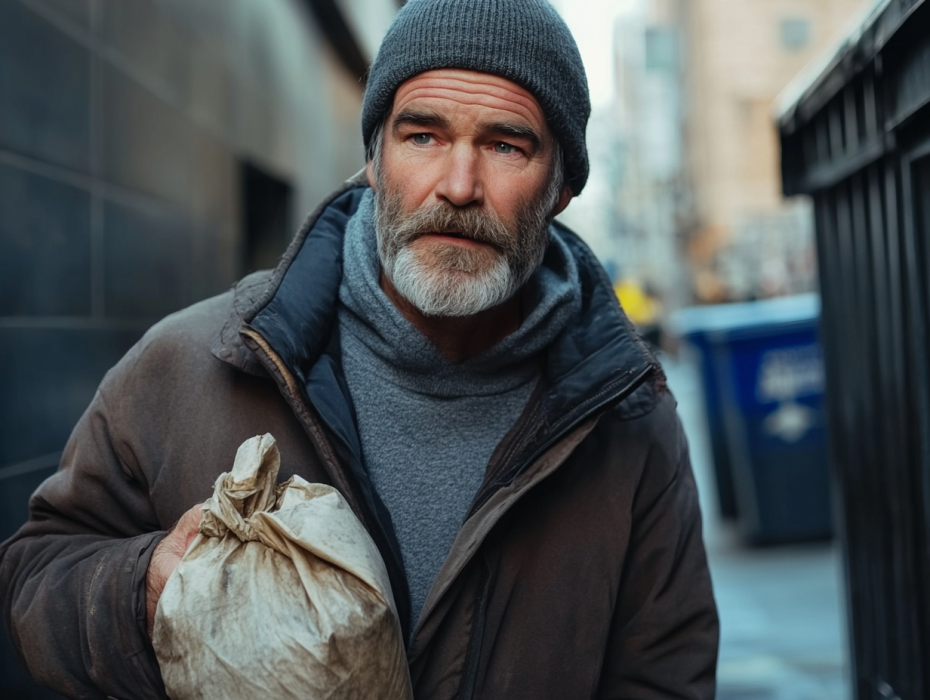
He grabbed his bag, whistled once. Lucky bolted beside him. They ran. Not full speed—just fast enough to be gone before anyone gave chase. They’d been chased before. Once the cops get involved, you don’t get food, you get warned. Or worse. He wasn’t sticking around to see which.
He didn’t stop until they were two blocks away. Breath heavy, chest burning, he dropped down near a lamppost. The street pulsed around him—cars speeding by, people moving fast with purpose. He held out his cup, kept his head low. A minute passed. Nothing. Five. Still nothing.
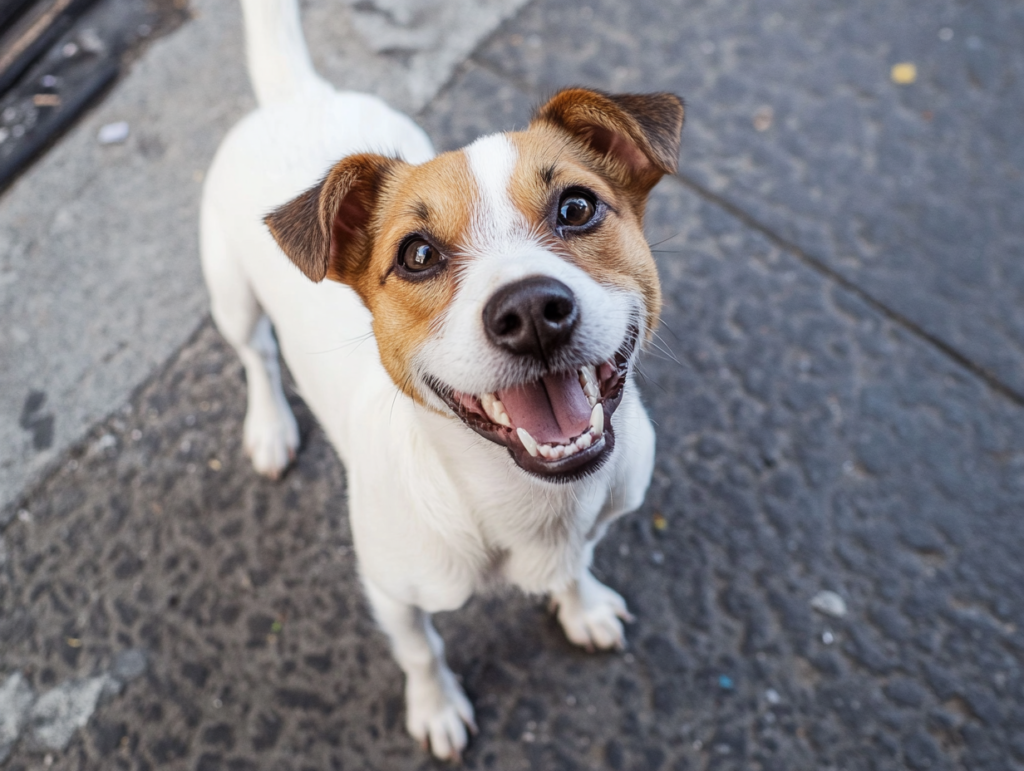
Joshua glanced down. Lucky wagged his tail, gave him that open-mouthed, stupid-happy dog look. No judgment. No shame. Just loyalty. Joshua reached out and scratched behind his ears. “At least you think I matter,” he muttered. It came out dry. Tired.
Someone slowed. A girl. Teenager, schoolbag slung low. She looked at him, then dug into her bag. No hesitation, no words. Just a sandwich in a zip bag. She handed it over. Joshua stared at it. “Thanks,” he said quietly. She walked off without waiting.
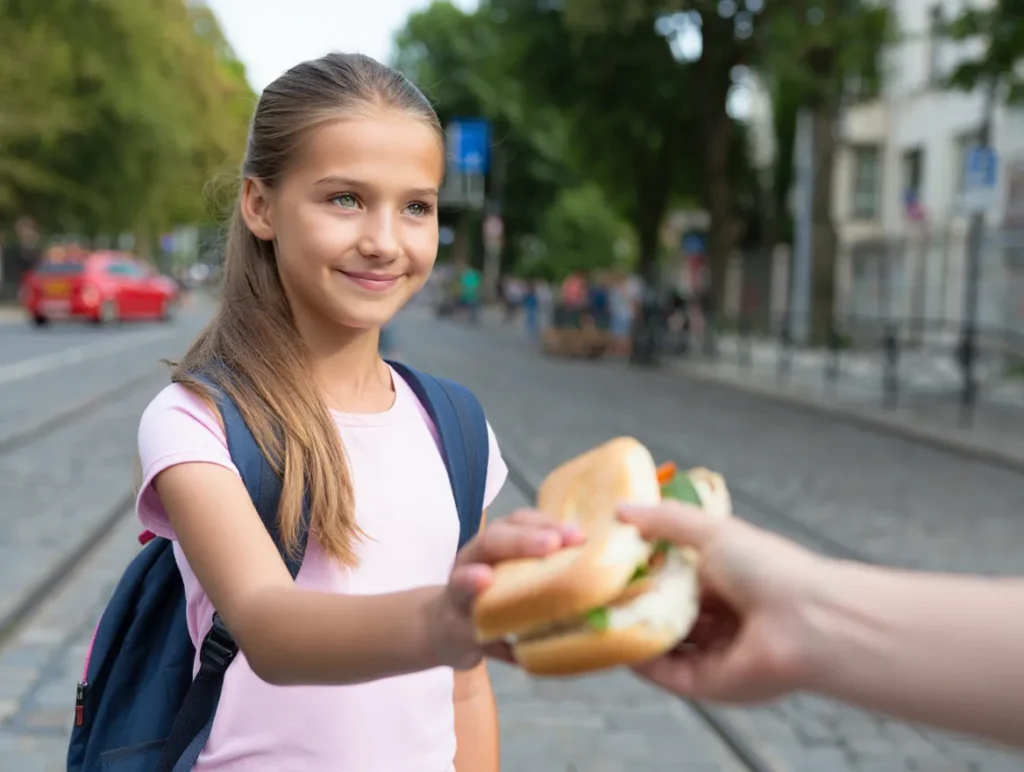
He looked at the sandwich—thick bread, real ham, clean wrapping. His stomach twisted. It would’ve been his best meal in days. Maybe weeks. He peeled it open and paused when Lucky sniffed the air and licked his lips. Joshua didn’t think long.
He gave the sandwich to Lucky without any second thoughts. Just held it out. Lucky ate fast. Joshua watched him chew, eyes sharp. He ignored the ache in his gut, his heart was full watching Lucky eat and for now, this was enough.
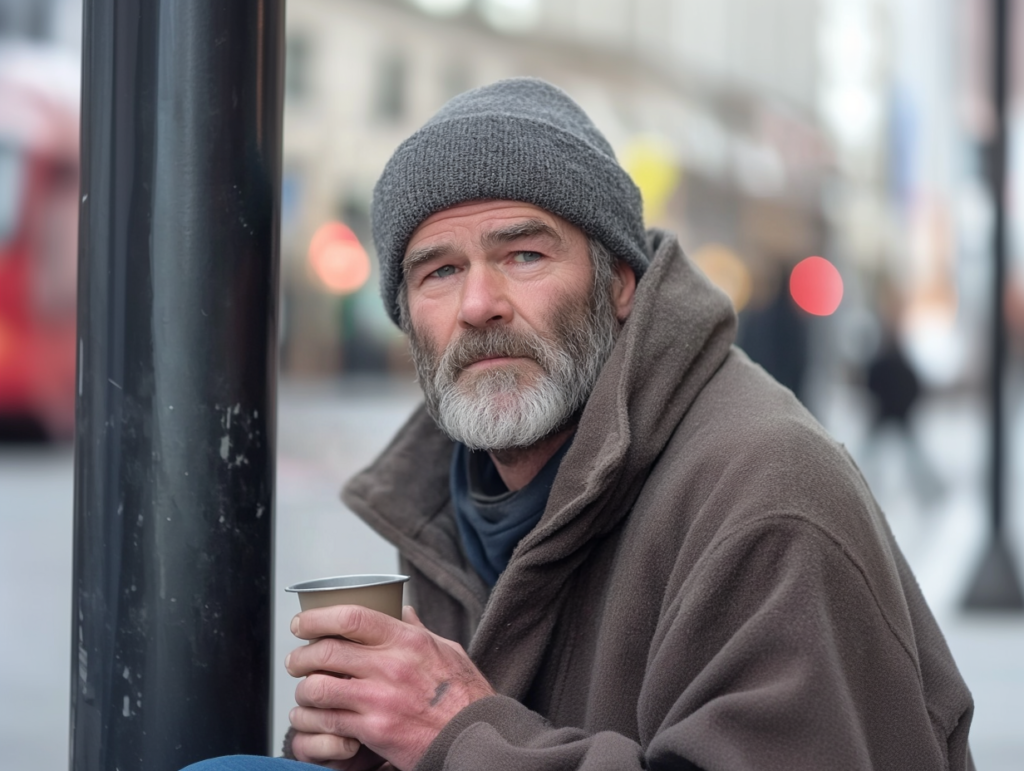
He leaned back against the pole, empty cup in one hand, his stomach rumbling. Lucky curled up beside him, licking crumbs from his paws. Joshua kept the cup out hoping someone would show some kindness, but as the world ignored his presence, his hope dwindled by every passing minute.
Joshua tried to keep himself from keeling over, stomach tight with emptiness, eyes half-closed as the world blurred around him. In that haze, his mind pulled him back—to a cold afternoon outside the soup kitchen, the kind of day when hunger made every second feel sharp and stretched.
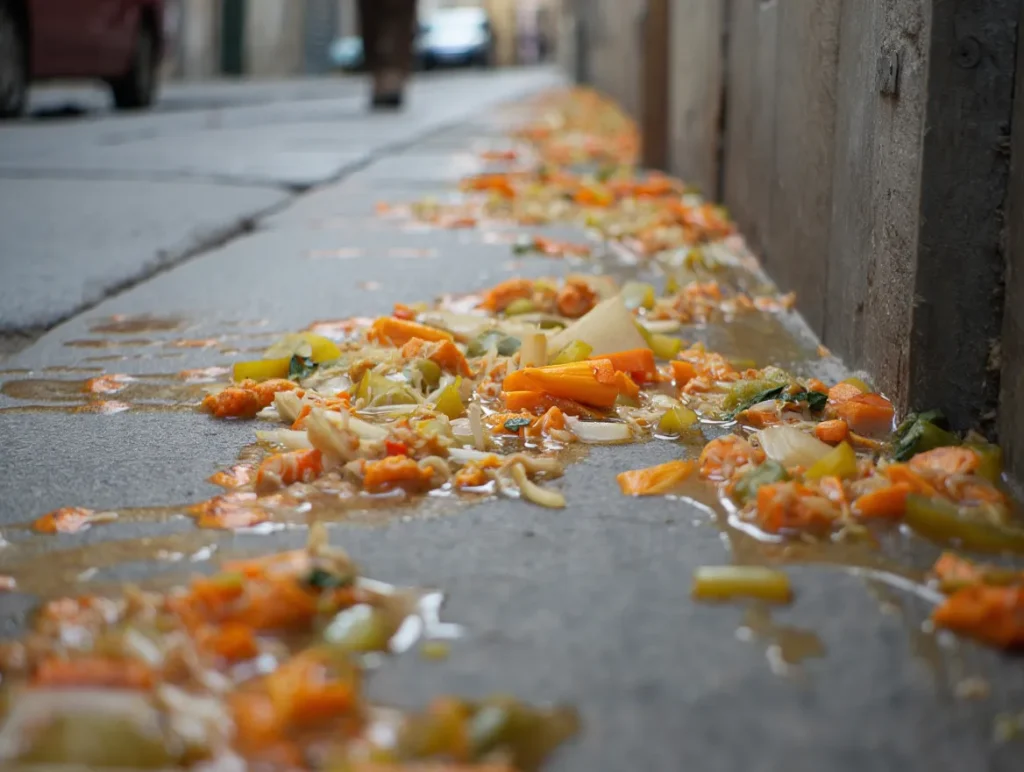
He’d just received a bowl of soup—watery but with enough vegetables and noodles—when someone behind him jostled forward. The impact knocked the bowl straight from his hands, and the soup splashed onto the pavement in a wet, steaming mess. He stood frozen, watching the broth soak into the concrete.
Before he could react, a stray dog trotted over—matted fur, ribs showing, a wild glint in its eyes—and began licking the soup off the ground, its tongue working fast like it hadn’t eaten in days. The people in line ignored it. Joshua didn’t. That was the only food he had.
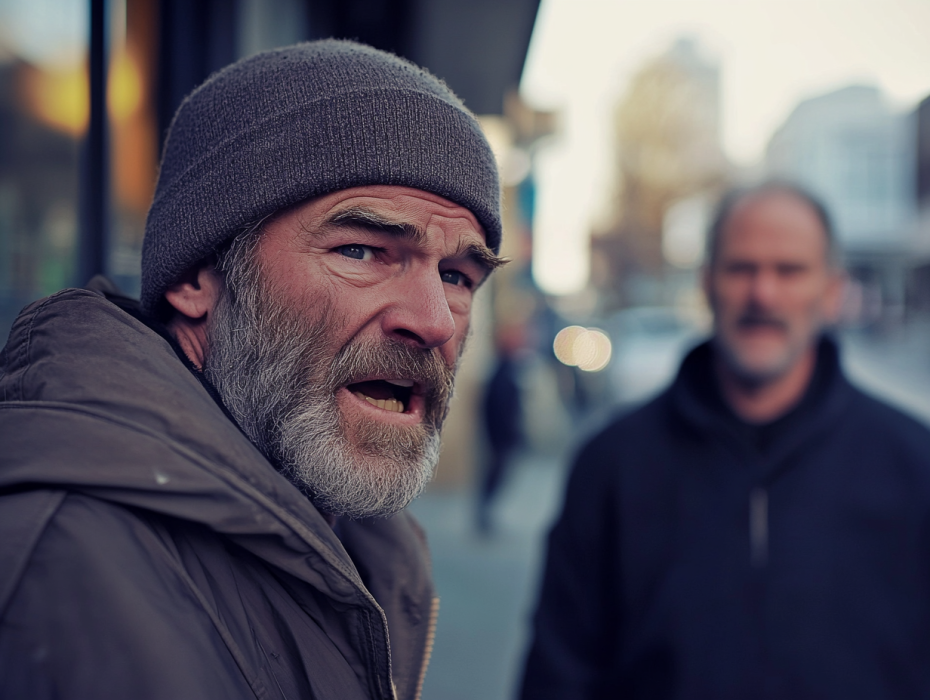
Frustration surged. He turned on the man behind him, voice cracking from cold and anger. “You couldn’t wait your turn?” The man, broad-shouldered and mean-eyed, didn’t take it well. Without a word, he grabbed Joshua by the collar and pulled him forward like he weighed nothing at all.
Joshua’s heart pounded. He expected a punch, maybe worse. But just as the man pulled back his arm, the same scruffy dog stopped licking and let out a sharp, loud bark. Then another. It rushed at the man, growling, teeth bared—not attacking, but close enough to make him pause.
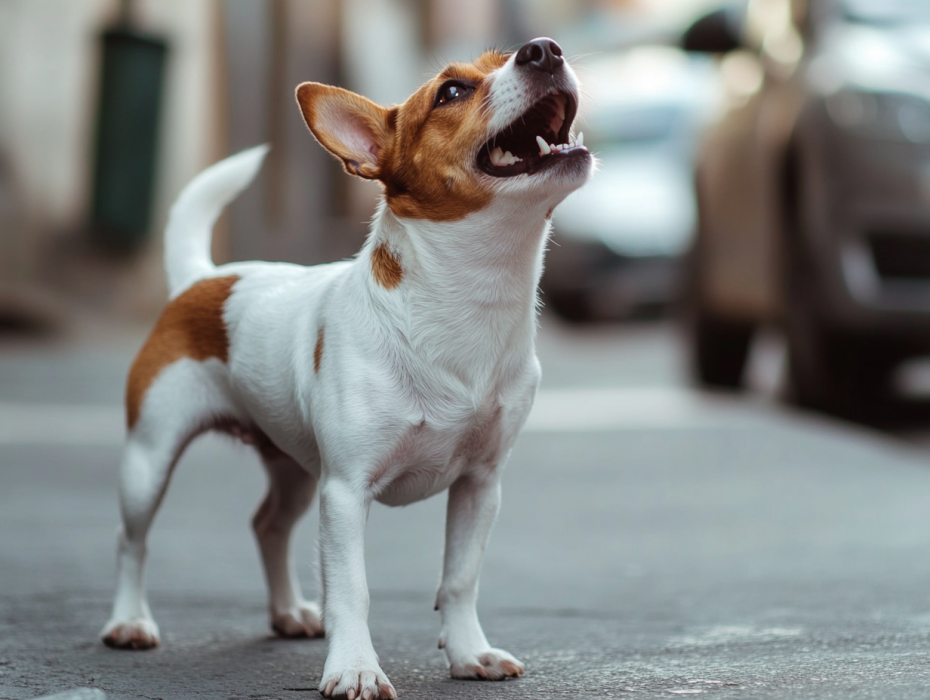
The man hesitated, scowled, and finally dropped his grip. “Crazy mutt,” he muttered, stepping back into the line. Joshua staggered, adjusting his coat, still stunned. He looked at the dog, now calm again, sitting by his feet like it had done this a hundred times before.
Joshua got back in line, this time at the very end. He didn’t expect a second bowl—he never had before. Shelters ran out of food fast, and seconds were almost unheard of. But he stood there anyway, hungry enough to hope, while the dog stood beside him like they belonged together.
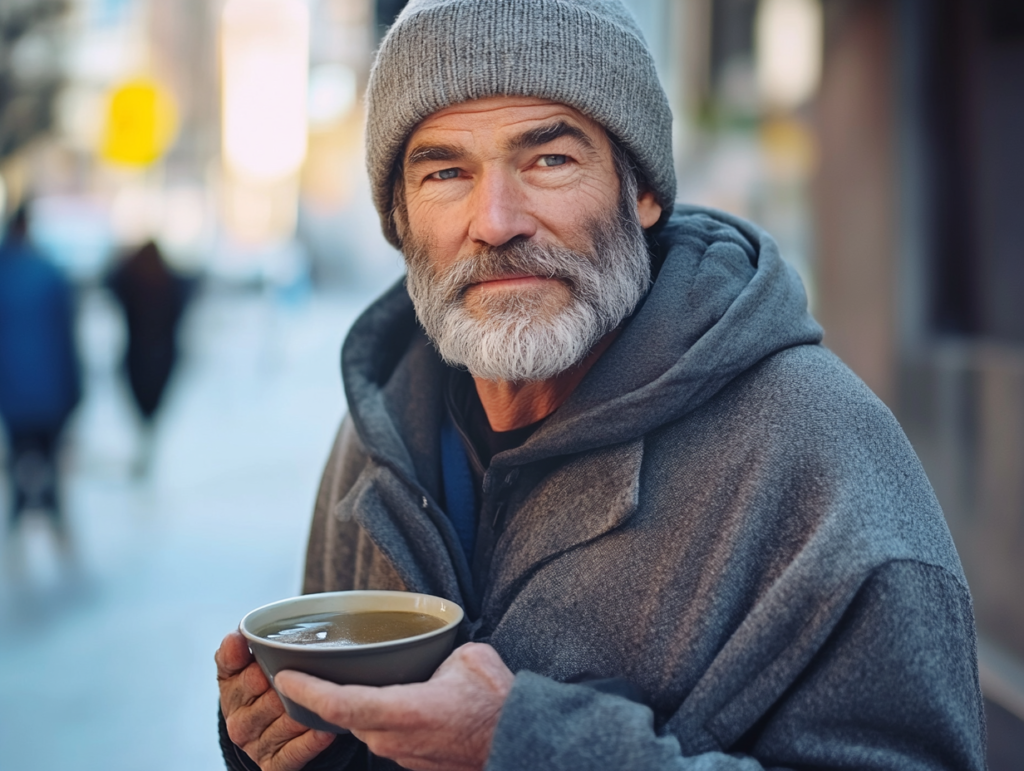
When he reached the front again, he braced for disappointment. But without question or pause, the volunteer ladled a fresh bowl and handed it to him. Joshua stared at it for a second before taking it, the heat cutting into his cold fingers. Somehow, there was still food left.
He walked away slowly, steam curling from the bowl, while the dog trotted behind him with the same quiet confidence. Joshua sat by a wall near the alley, ate in silence, and tossed the dog a crust of bread. It caught it mid-air and wagged like it had won the lottery.
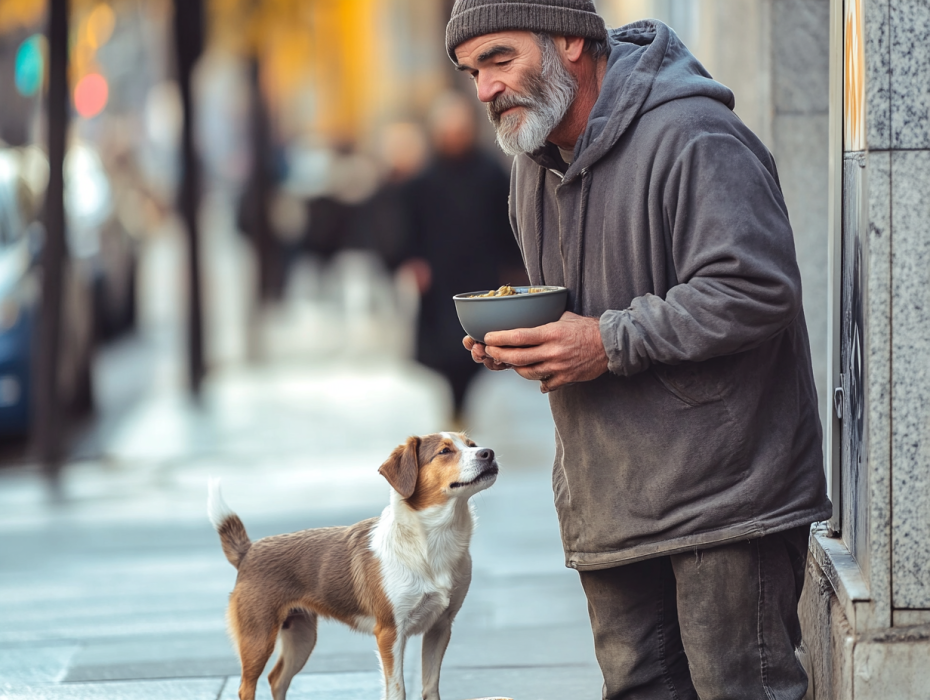
Afterwards, he tried to shoo it off. “Go,” he muttered. “You got your piece.” But the dog didn’t move. It just wagged again, tongue lolling, sitting like it belonged. Joshua looked at him for a long time. “Alright then… Lucky. That’s what I’ll call you. Because today, we both were.”
Joshua didn’t get a single dollar that day. The cup stayed empty, and every glance that passed over him landed somewhere else. As the sky darkened, he stood up slowly and made his way toward the alley behind the old bookstore—a quiet, tucked-away corner where he could try to sleep.
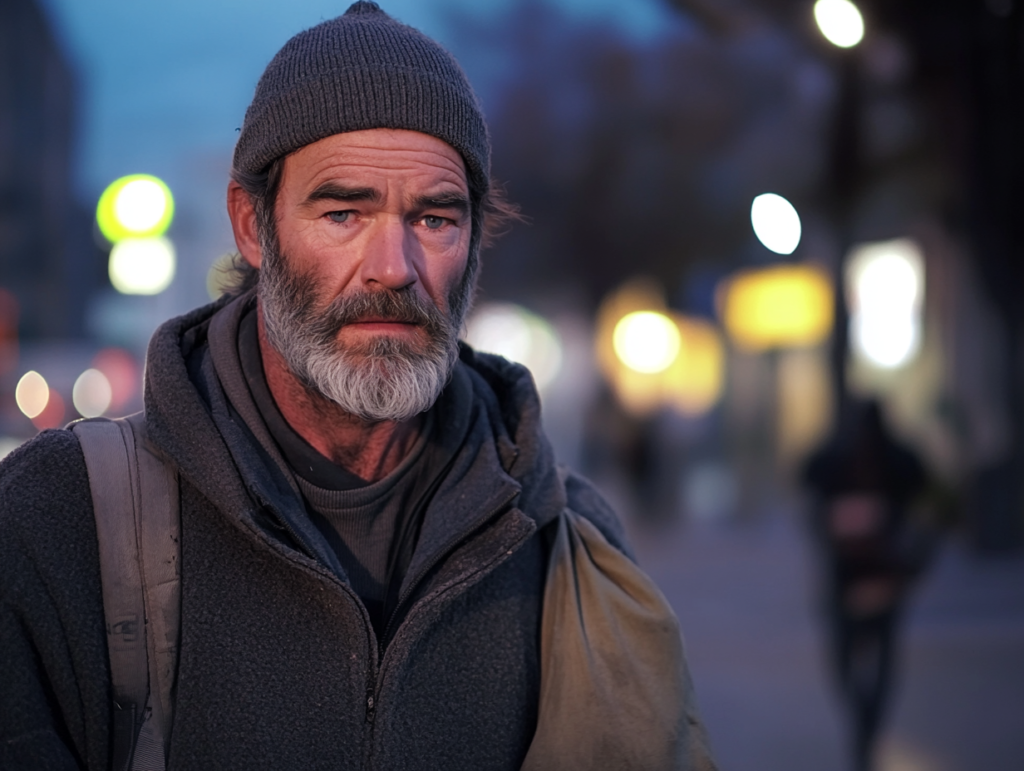
It wasn’t comfortable, but at least there was less noise and fewer interruptions. That was the best he could find now—somewhere still enough to close his eyes. As he turned into the alley, he heard two people standing outside the bookstore, smoking and chatting casually.
One of them glanced in his direction and said, “You see what I mean? They’re everywhere.” The other replied, “Thank God for the citywide cleanup though. Hopefully we’ll start seeing fewer of them out here.” The comment wasn’t whispered. They didn’t care that he heard it.
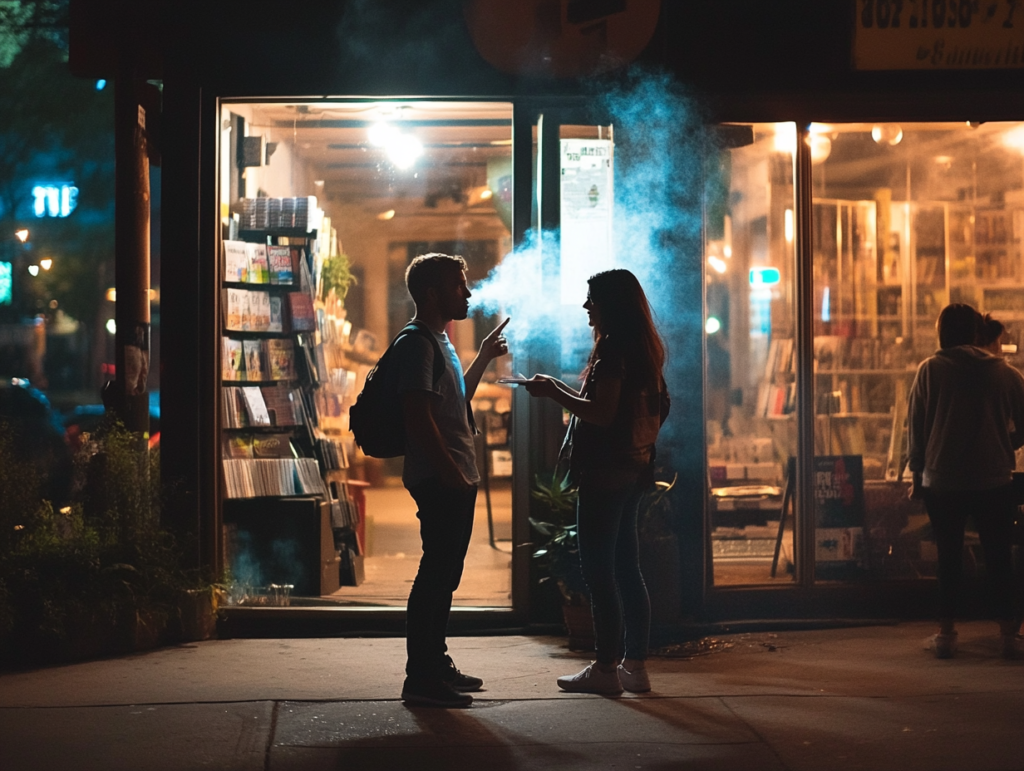
Joshua kept walking without reacting, but the words stuck. He hadn’t heard anything about a cleanup. That was the first time. It explained the police vans he’d seen near the bus depot. It explained why benches were suddenly taped off. They were being pushed out, one corner at a time.
That night, as he lay on the cold ground with Lucky curled beside him, the restlessness didn’t come from hunger. It came from the growing sense that even the few places he had left were being taken away. If this alley wasn’t safe, nowhere would be.
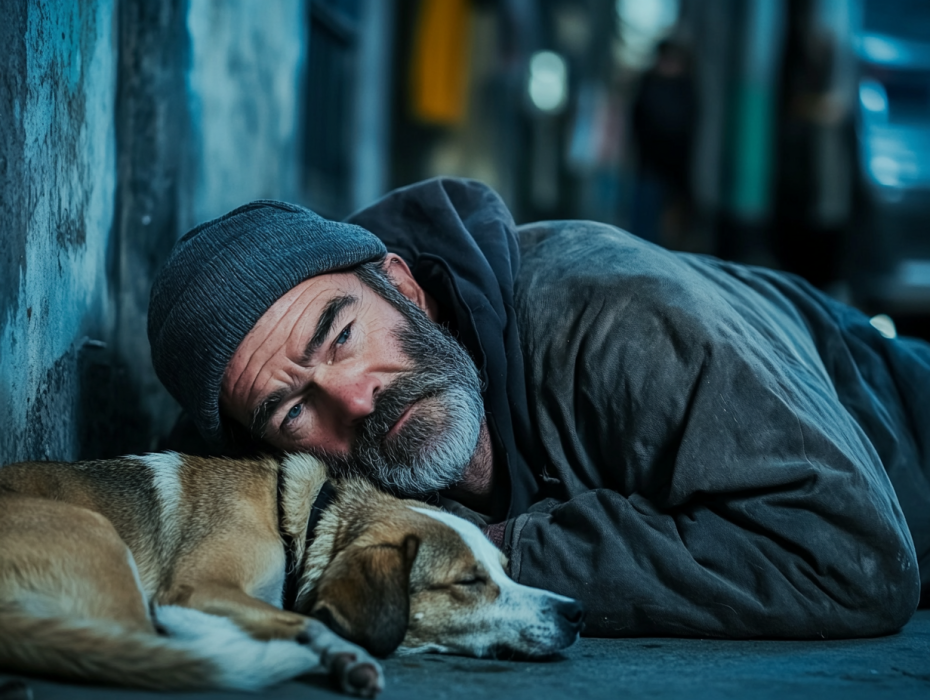
He couldn’t just keep moving forever. Not without losing himself entirely. Somewhere deep in his chest, an old thought began to resurface—he had to try again. He couldn’t remember the last time he had felt willing to try. But now, the pressure left no room to stall.
He thought about the laundromat he used to sleep behind. That place had always smelled like soap and warm steam. Now, there was a new sign in the window: “Help Wanted – Temporary Position.” It wasn’t much. But even a day’s work meant food, or maybe more.
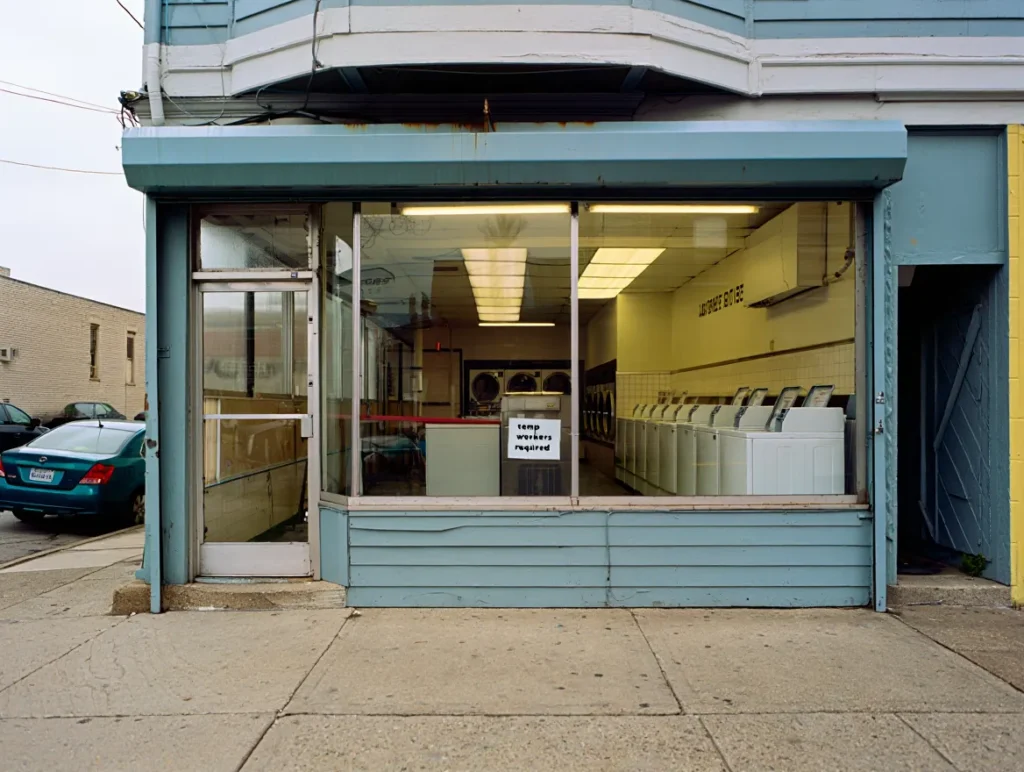
Joshua knew how these things worked. He couldn’t walk in looking like this—not if he wanted to be taken seriously. He needed to be presentable. And more importantly, he needed a phone number and an address. He didn’t have either. Still, something told him he had to try.
The next morning, he walked to the shelter he hadn’t stepped into in over a year. The woman at the desk didn’t recognize him, but she listened. When he explained he was hoping to apply for work and needed help, she nodded. There was space, she said.
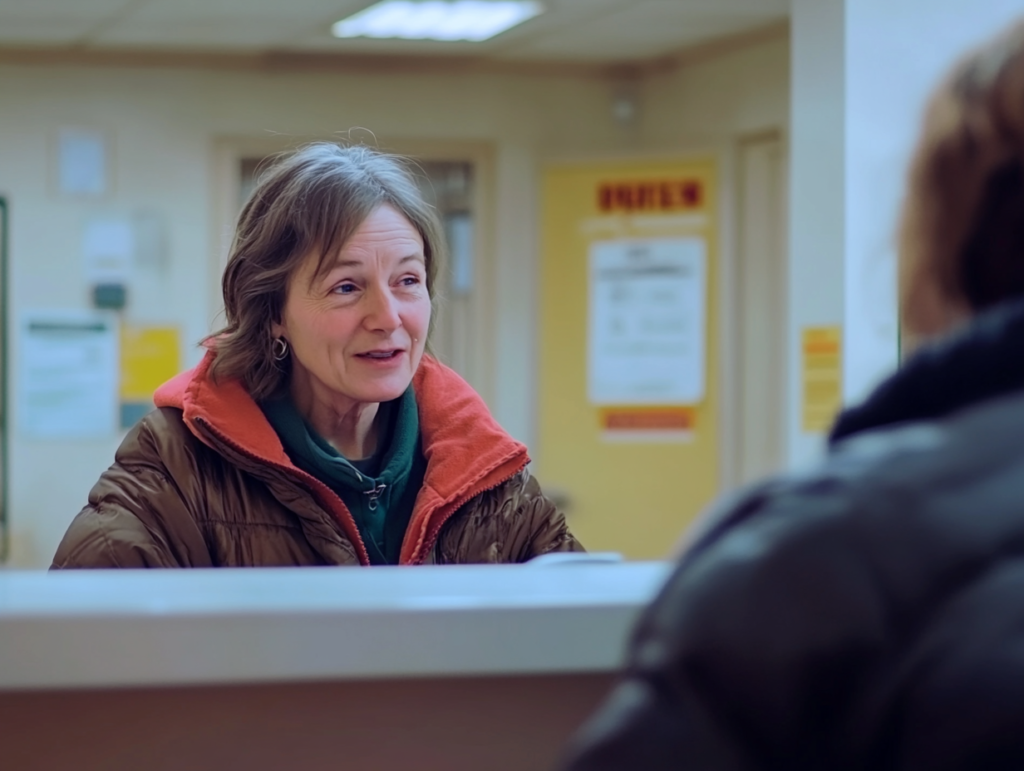
They could offer him a bed for a few days. A place to shower. The shelter’s landline could be used for callbacks, and he could list the address on the form. They even had a few donated shirts and jackets in the back, if he wanted to look presentable.
It felt almost unreal. For the first time in years, something that sounded like a plan was taking shape. He could picture himself walking into that laundromat with clean clothes, handing over a form, maybe even shaking someone’s hand. The hope caught him off guard.
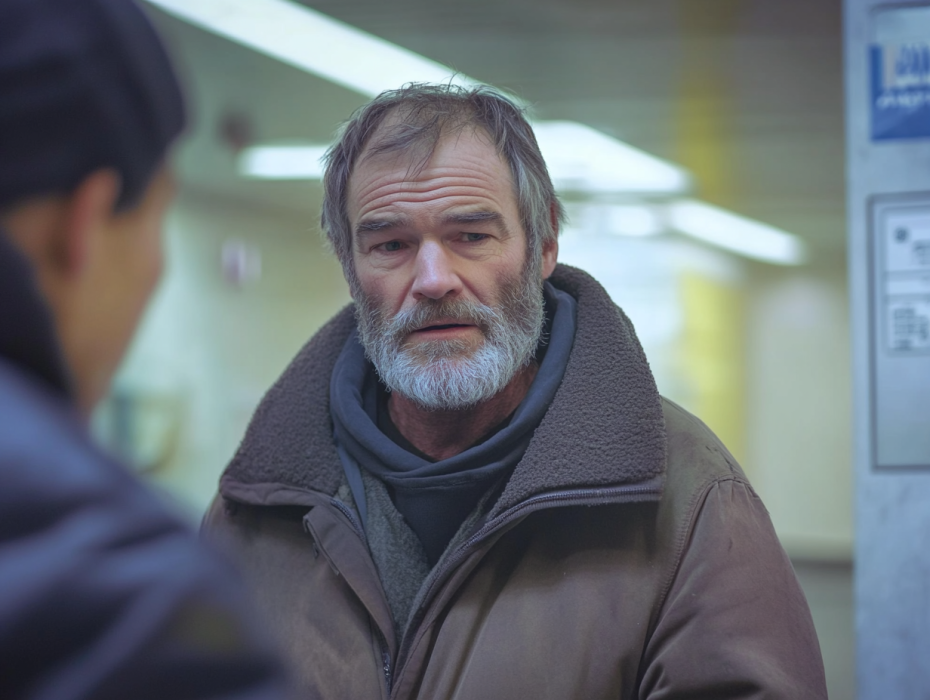
But just as quickly, it slipped away. “No dogs allowed,” the woman added, apologetically. “It’s policy. You’d have to leave your pet outside, or with someone else. I’m sorry.” Her tone was kind, but firm.
The words landed hard. No dogs. No exceptions. He had been seconds away from something solid—something that could shift the direction of his life. And now, it slipped right through, because the one being who had never left his side wasn’t welcome. The rules weren’t up for discussion, and Joshua knew it.
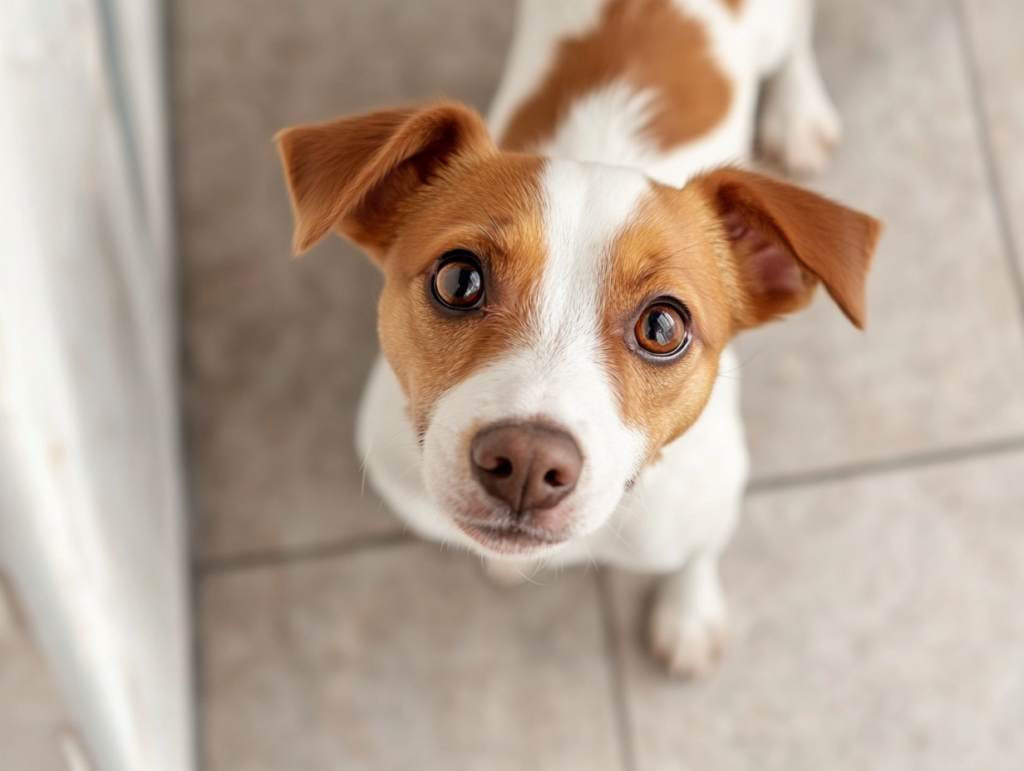
He looked down at Lucky, who was resting at his feet, eyes half-closed, trusting. Joshua stood still, unsure of what to do. The answer was clear, but it didn’t feel fair. He left the shelter quietly. If Lucky wasn’t welcome, then neither was he. That much hadn’t changed.
Joshua was disappointed, but he knew sitting with that feeling wouldn’t change a thing. If the city’s cleanup plan rolled out fully, he’d lose the few safe corners he had left. And if that happened, he’d lose Lucky too. He had to do something. Fast.
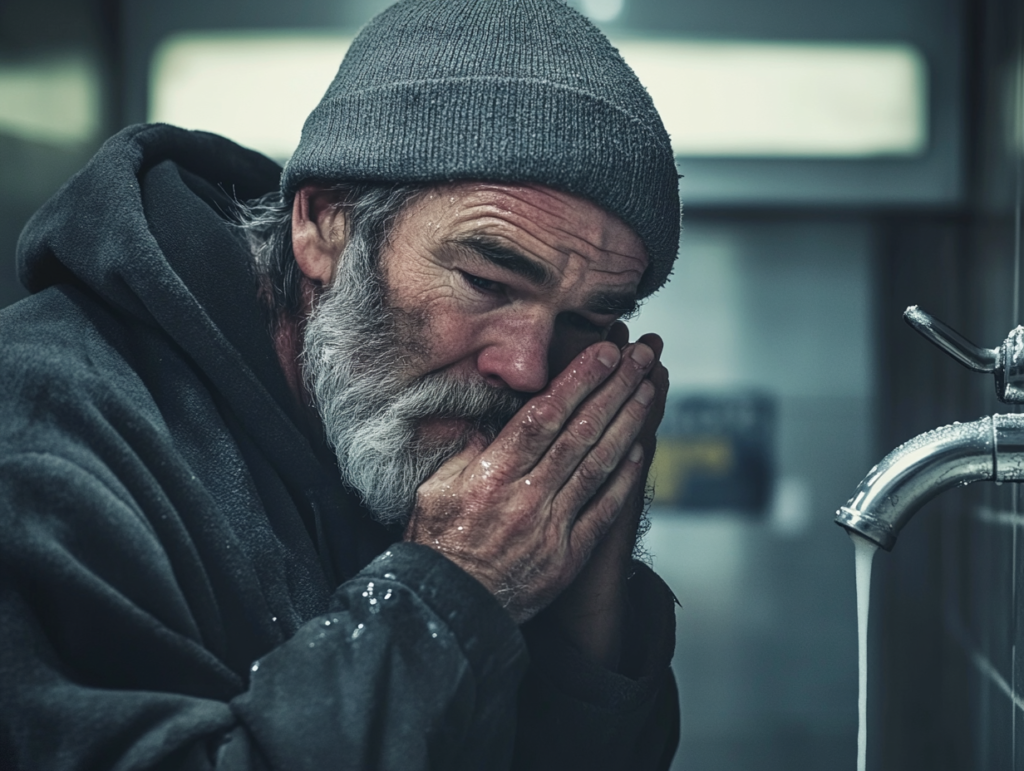
He cleaned up at the gas station restroom again, same routine. Soap from a near-empty dispenser. Splash water on the face. Scrub his arms and neck with tissues. His reflection was blurry, but clearer than usual. Damp hair. Tired eyes. He still looked rough, but at least he looked awake.
Outside, he passed a bakery bin and spotted a half-eaten croissant on top of the trash pile. No mold. Still warm inside. He broke it in half and ate slowly, making it last. Lucky stared, wagged his tail once. Joshua handed over the other half without hesitation.
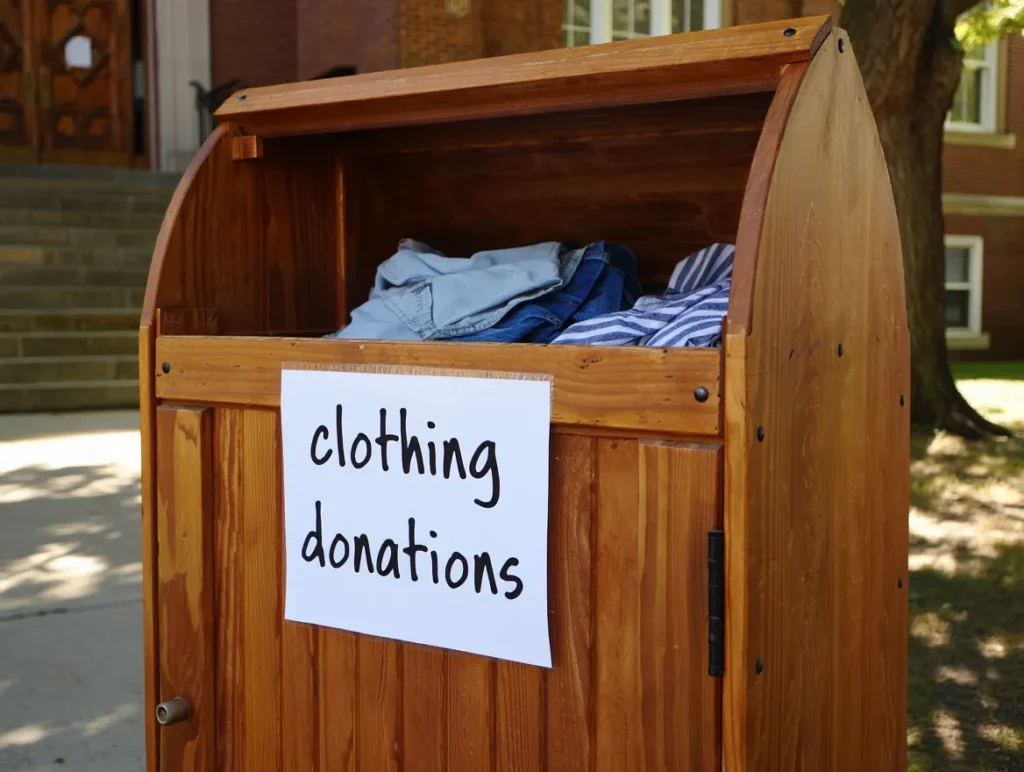
A block away, outside a small church, he noticed a donation box marked “PLEASE DONATE USED CLEAN CLOTHES” He peered in. Beneath an oversized coat was a folded pair of brown pants and a plain button-down shirt—clean, decent, nothing flashy. He grabbed them like they were gold.
As he turned to leave, a woman sweeping near the church doorway called out, “Got what you were looking for” Joshua hesitated, then said, “Yeah, I’ve got a job interview.” She smiled, not surprised. “Oh, good luck with that!.” He nodded and thanked her twice before walking off.
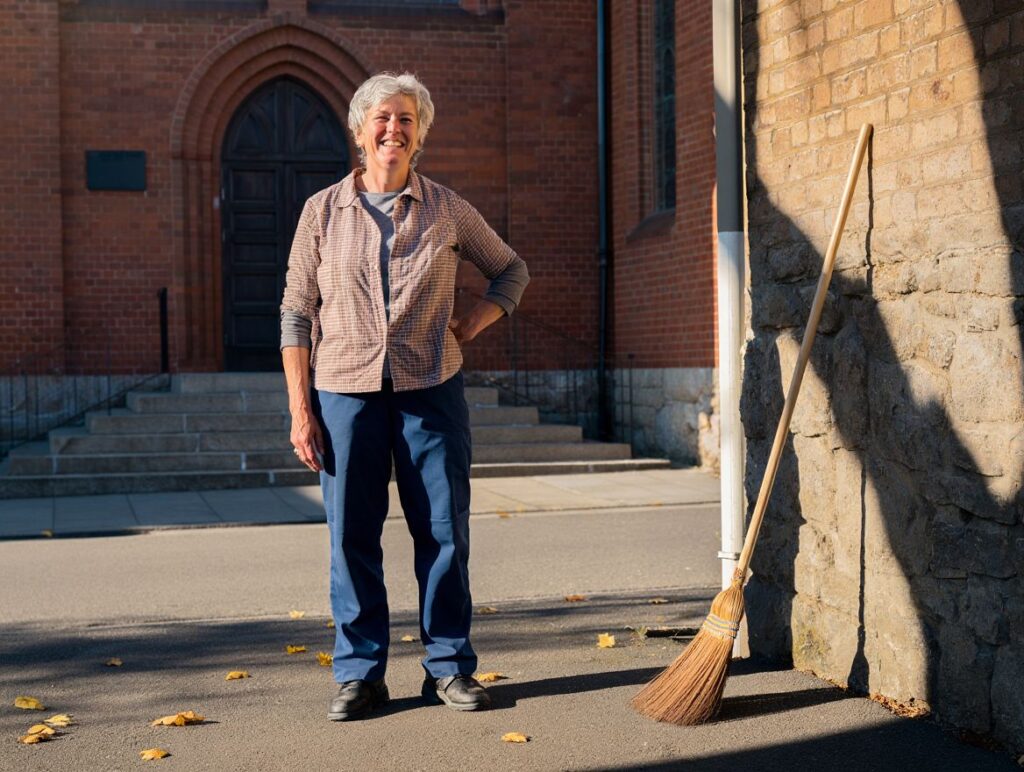
He found a spot near a bus stop bench and changed quickly, folding his old clothes into his bag. He brushed his shoes with napkins again and wiped dust from his sleeves. He wasn’t polished, but he looked like someone trying—and sometimes, that was enough to change the conversation.
He waited outside the laundromat for twenty minutes before stepping in. A man behind the counter asked if he was here for the temp role. Joshua nodded. They spoke briefly. The man asked if he could handle long shifts. Joshua said, “Yes.” That was it. “Trial run. Tomorrow. Six a.m. sharp.”
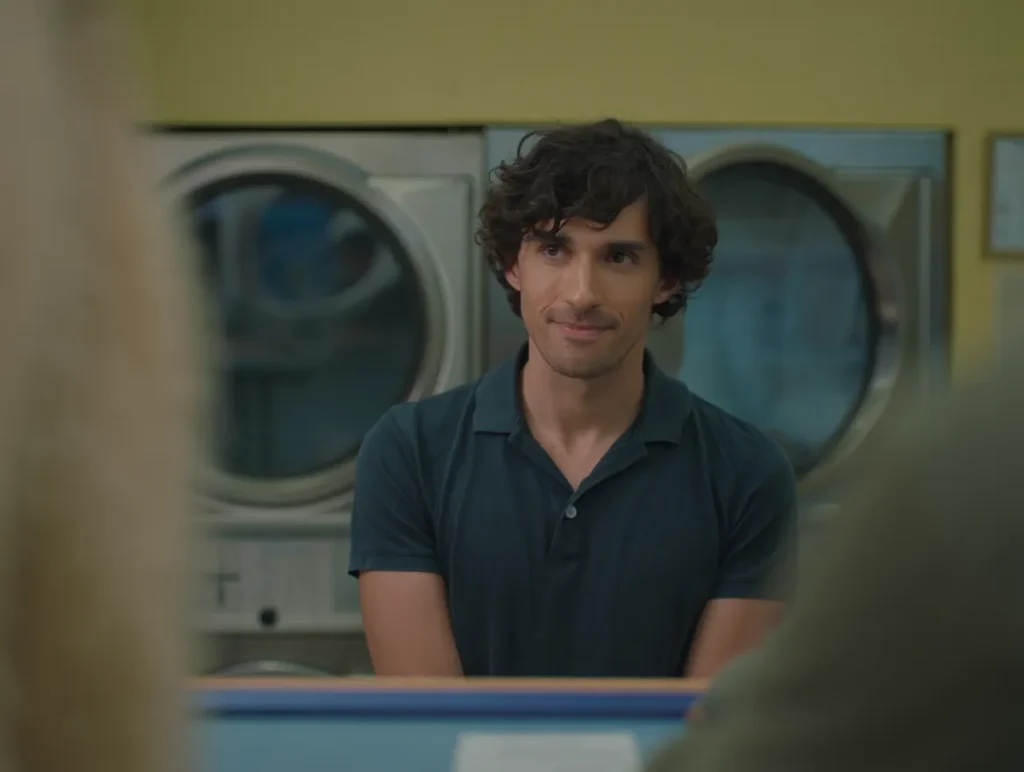
Outside, Joshua let out a long breath. Not joy, not victory—but something close. He changed out of the church clothes behind a delivery van, folded them carefully, and placed them in a plastic bag to keep clean. He couldn’t afford to get them dirty before the trial day tomorrow.
That night, Joshua and Lucky settled near the loading dock again. Joshua pulled his tattered coat tighter and sat with his back against the wall. Lucky curled beside him, resting his head on Joshua’s foot. Joshua looked at the sky for a long time. “I think I’ve got a shot this time,” he said softly.
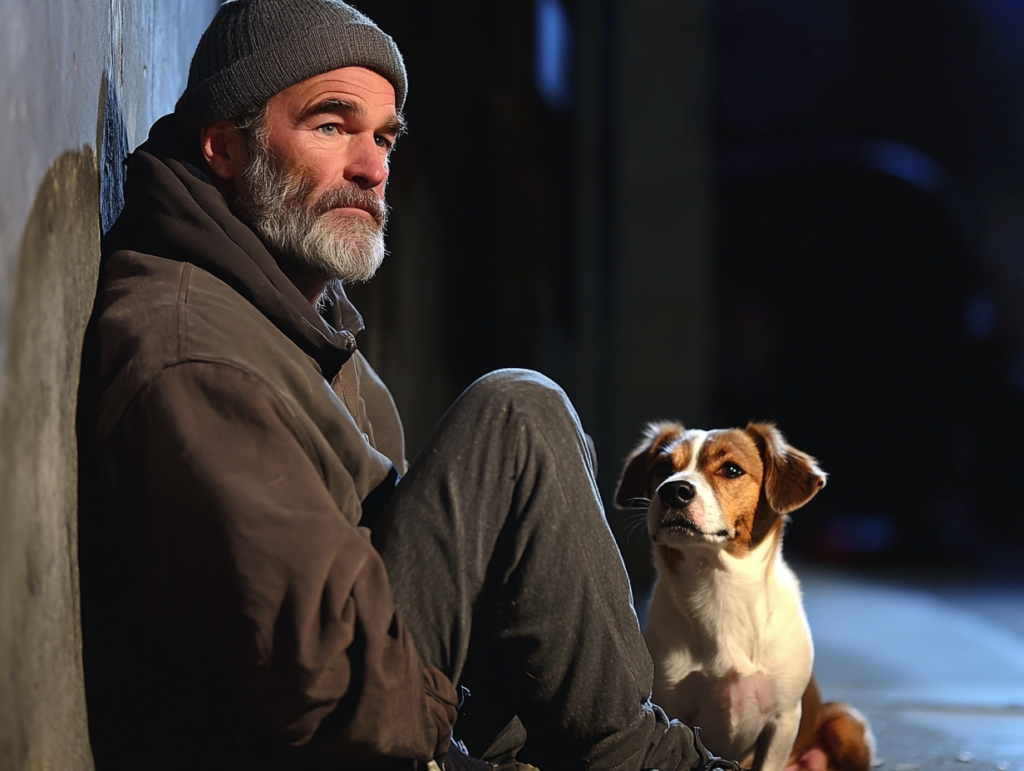
Lucky just licked his face in response. Joshua reached down and stroked his back once. “Just one day,” he murmured. “Let me have one good day. I’ll figure the rest out after that.” Then he leaned back and closed his eyes, holding on to the quiet shape of hope just long enough to sleep.
It came hard and without warning. One minute, the sky was still. The next, thunder cracked and rain came down like someone had split the clouds in half. Joshua jolted upright, heart racing. He lunged for the bag beside him, already feeling how heavy it had gotten.
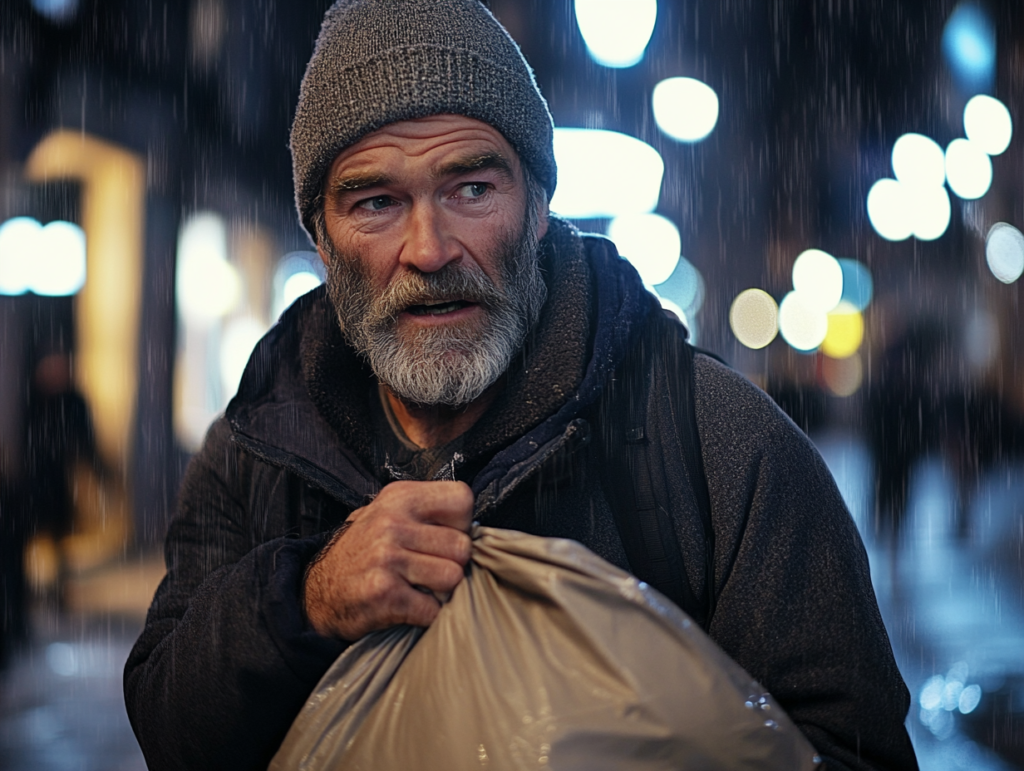
“Shit, no—no, no,” he barked, dragging it toward him. The plastic was thin. Water had gotten through. He pulled open the knot and saw the shirt — soaked, clinging to the pants like they’d been dunked in a bucket. He shook them out and looked up at the sky, helpless.
He yanked off his coat and tried to cover the clothes, but the damage was done. The concrete around him flooded fast. Lucky whined low, crouched beneath a bent shopping cart. Joshua cursed under his breath and kept pressing the clothes against his chest like that would dry them.
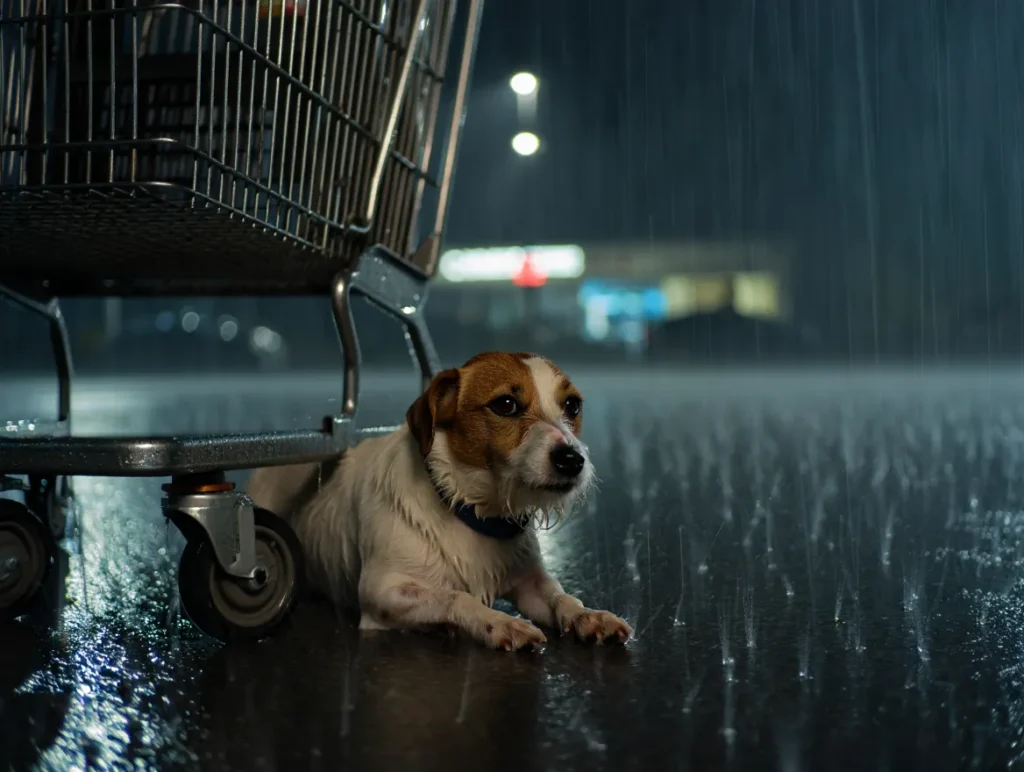
By morning, everything he owned was drenched. He found a public restroom with flickering lights and pushed the door shut behind him. The shirt slapped wet onto the sink. He shoved it under the hand dryer, fingers working the fabric. It steamed. Not enough. The pants were worse.
He tried everything — squeezing them, flipping the shirt under the heater, patting his shoes dry with toilet paper. The floor was puddled, the mirror fogged. He stared at his reflection—his face red, eyes tired, breath short. He looked like a man begging the world not to look too closely.
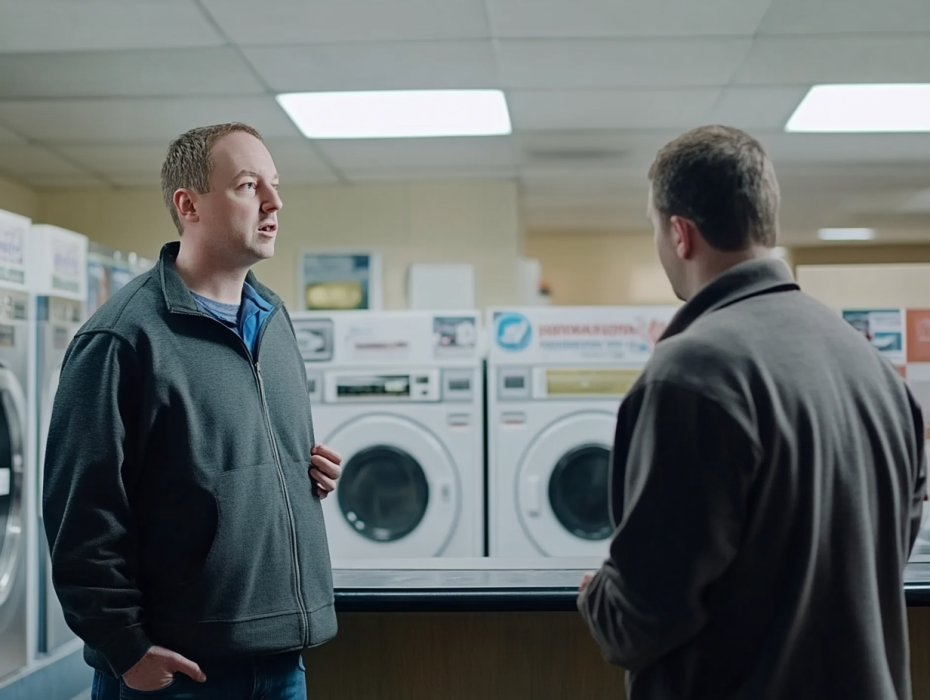
He ran to the laundromat, shoes squelching, damp sleeves sticking to his arms. He stepped through the door at six-thirty. The man behind the counter didn’t look up right away. When he did, he gave a half-frown. “You’re late,” he said. “That guy came in on time.”
Joshua’s mouth opened, but nothing came out. His chest felt tight. He looked down at himself — wrinkled shirt, pants creased and still damp, hair flattened to his head. He felt exposed. Small. The man added, softer this time, “We already gave the position to him. Sorry.”
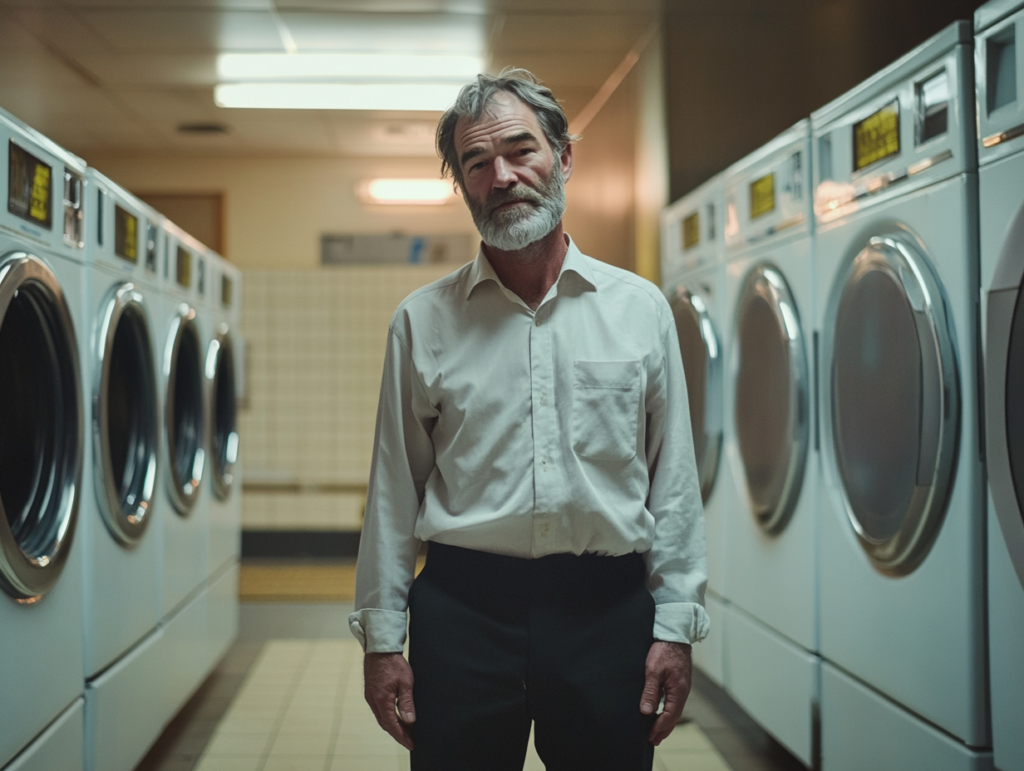
Joshua turned without a word. His legs moved on their own. Outside, he sat on the curb, water soaking into his pants again. His hands rested uselessly in his lap. The bag was beside him, sagging. Lucky sat down quietly, watching. No wagging. Just waiting.
The door opened. The man walked out, handed him a sandwich wrapped in foil and a hot cup of coffee. “Take this,” he said. “You showed up. That still counts for something.” Joshua nodded once and took it, more out of reflex than thanks. The man went back in.
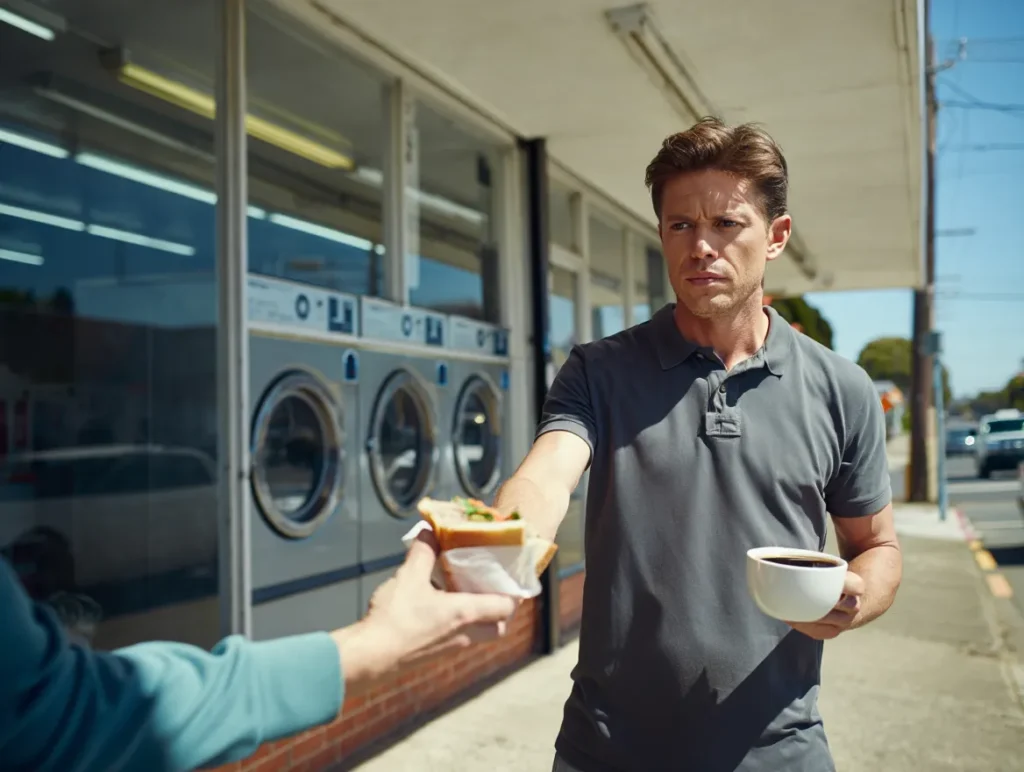
He ate slowly, not because he wanted to savor it but because he didn’t know what else to do. Half went to Lucky. The other half sat in his mouth like wet cloth. The warmth of the coffee didn’t reach anything inside him. All he’d done. All he’d hoped. Washed away at night.
He turned away and stood with an empty cup in his hand again. He didn’t bother saying anything, just stood in places where people might drop change, his back straight, the bag with his clothes tucked under one arm. He kept Lucky close, one hand resting on the dog’s back. The hours passed. Nobody stopped. Nobody even slowed.
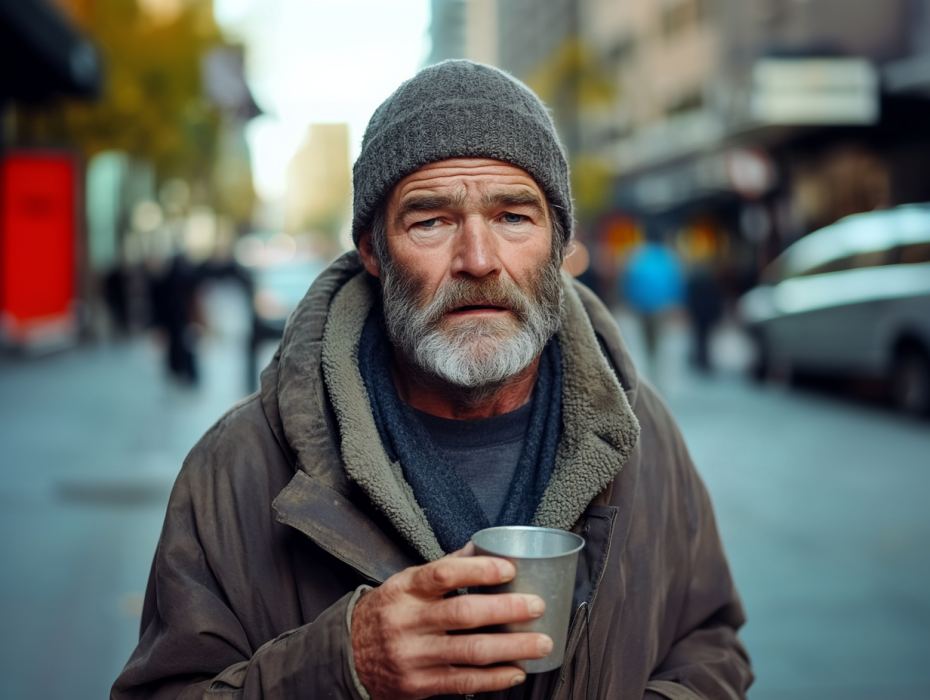
A man in a hoodie passed him twice. On the third pass, he muttered, “Get a job,” without looking at him. Joshua didn’t react. He didn’t have the energy. Outside a convenience store, someone flicked a coin near his feet. It bounced, rolled under a bench. He didn’t chase it.
By late afternoon, his knees burned and his calves cramped. The sandwich from the morning was long gone. Lucky walked beside him with a soft limp—one of his paws must’ve landed wrong on a crack somewhere. Joshua crouched to check, whispered, “We’ll stop soon.”
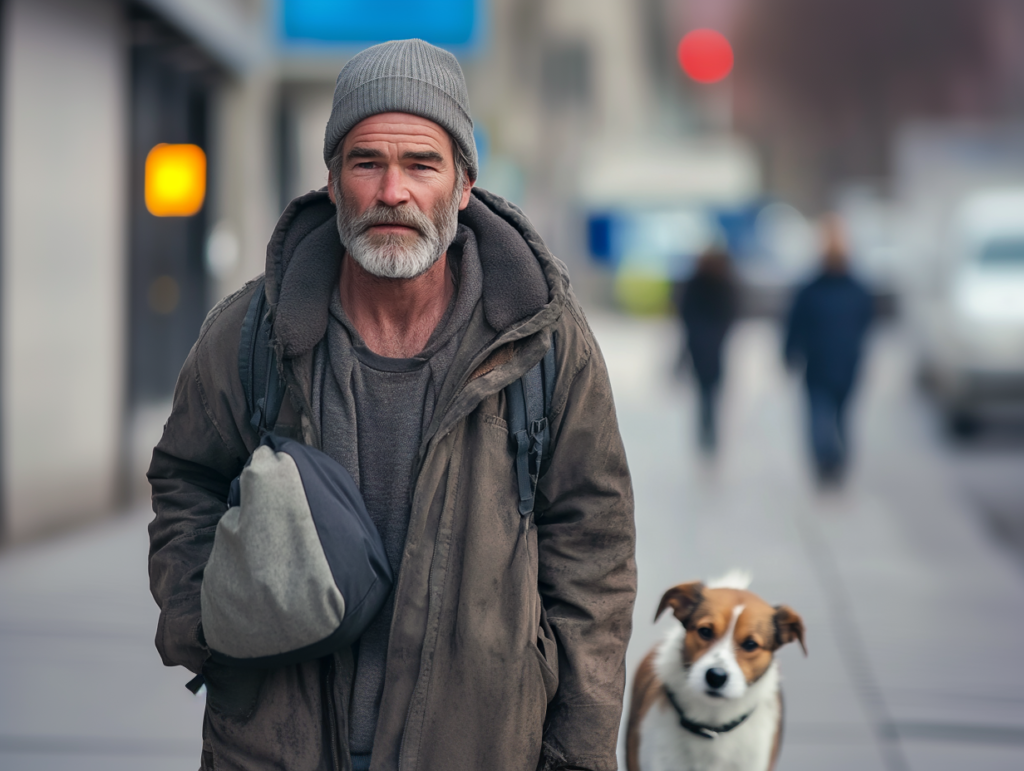
He moved toward the outer edge of the city. Fewer people, fewer cops, and fewer risks of being told to move along. Past the loading docks, he found a stretch of wall with crates stacked high on one side and a slope of concrete angled just enough to rest against.
He looked it over—dry, quiet, half-shielded from the wind. Lucky curled up immediately. Joshua dropped his bag behind the crates and sat with his legs out, arms crossed. His shoes were soaked again. It didn’t matter. This wasn’t a place to be comfortable. It was a place to disappear.
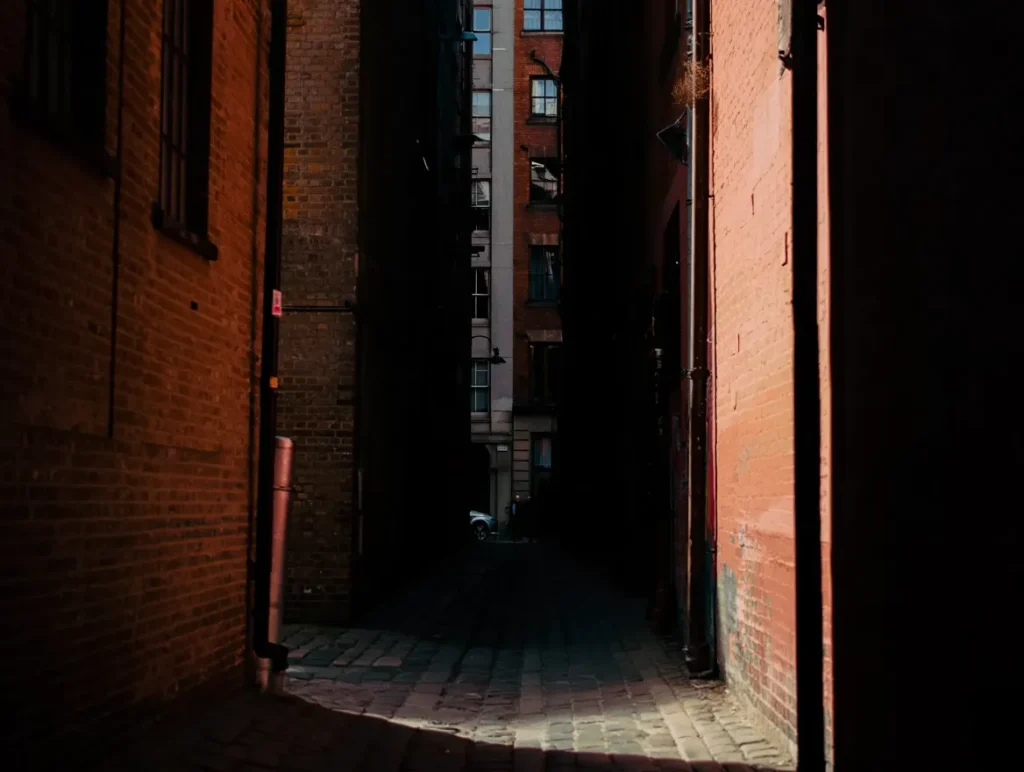
Across the street, a broken light flickered over a door that led into a backlot. Beside it, a narrow alley cut between two buildings. No security cams. No movement. Joshua stared at it for a while. Just a shortcut, probably. But something about it made him uneasy. He looked away.
Joshua was asleep when a scream tore through the silence, sharp and panicked. His eyes flew open. Lucky jerked upright beside him, ears perked. Joshua blinked into the dark, adrenaline flooding him fast. That hadn’t sounded like a drunk shouting or a couple arguing. That had sounded like danger.
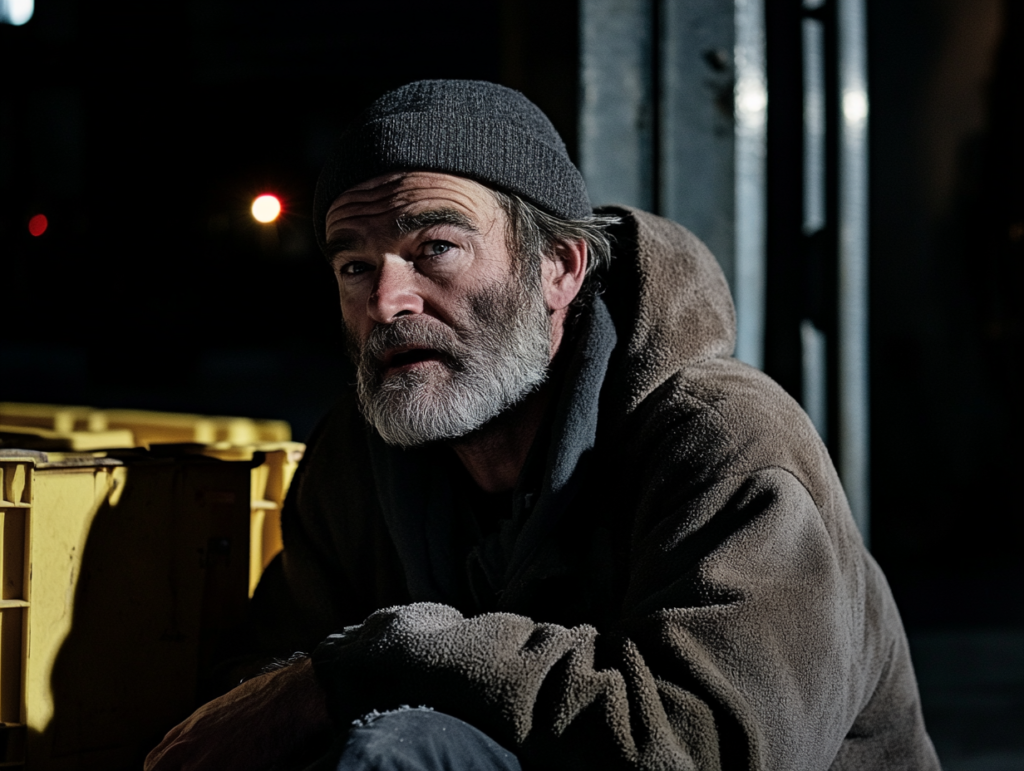
He got up quickly, grabbed his bag, and crouched low. “Quiet,” he whispered to Lucky, holding a finger up. Lucky stilled, alert and tense. Another voice echoed faintly—muffled, male, aggressive. Joshua squinted toward the alley across the street. It was dark. Too dark. But something was happening in there.
He crossed carefully, every step quiet against the damp pavement. Lucky padded beside him, silent and sharp-eyed. Joshua edged up to a dumpster near the alley mouth and peered around. A weak overhead bulb flickered like it couldn’t decide if it wanted to stay alive.
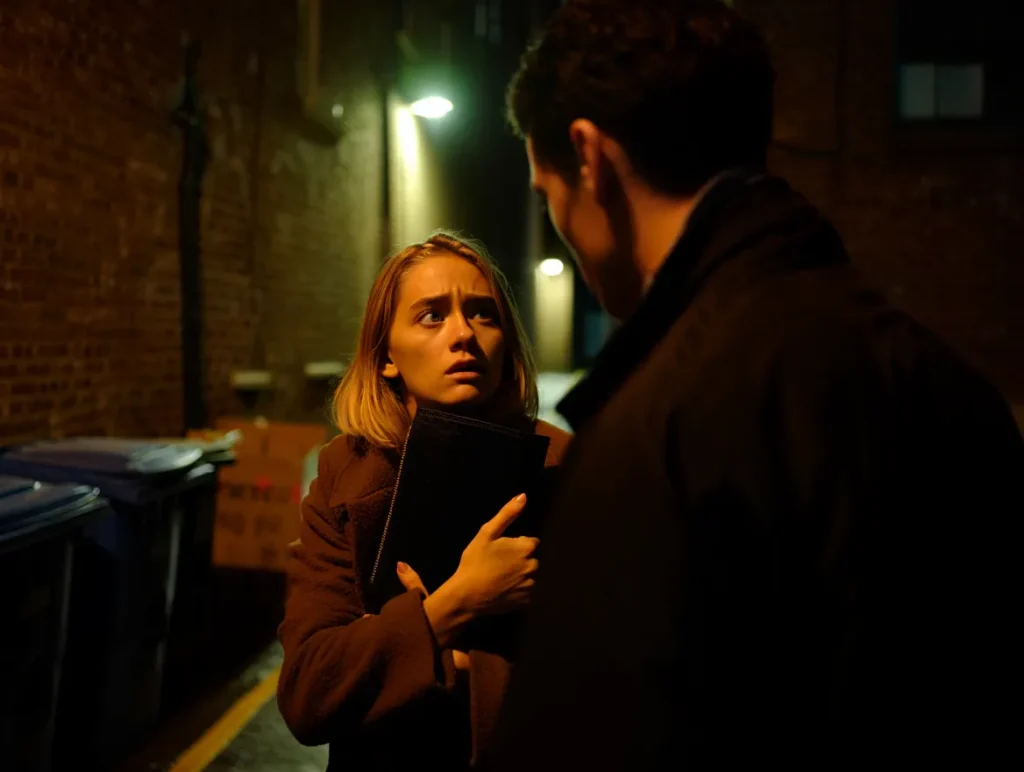
Inside the alley, a woman was backed against the wall. Her purse was clutched tight to her chest. A man loomed over her, greasy coat hanging open, one hand outstretched, the other holding a knife. “Come on,” the man growled. “Don’t be stupid.”
Joshua froze, pulse pounding. He had nothing. No weapon. No plan. But Lucky growled low beside him—too low for the mugger to hear. Joshua looked down at him. Lucky’s body was tense, ready. Joshua took a breath, nodded once. “Go,” he whispered.
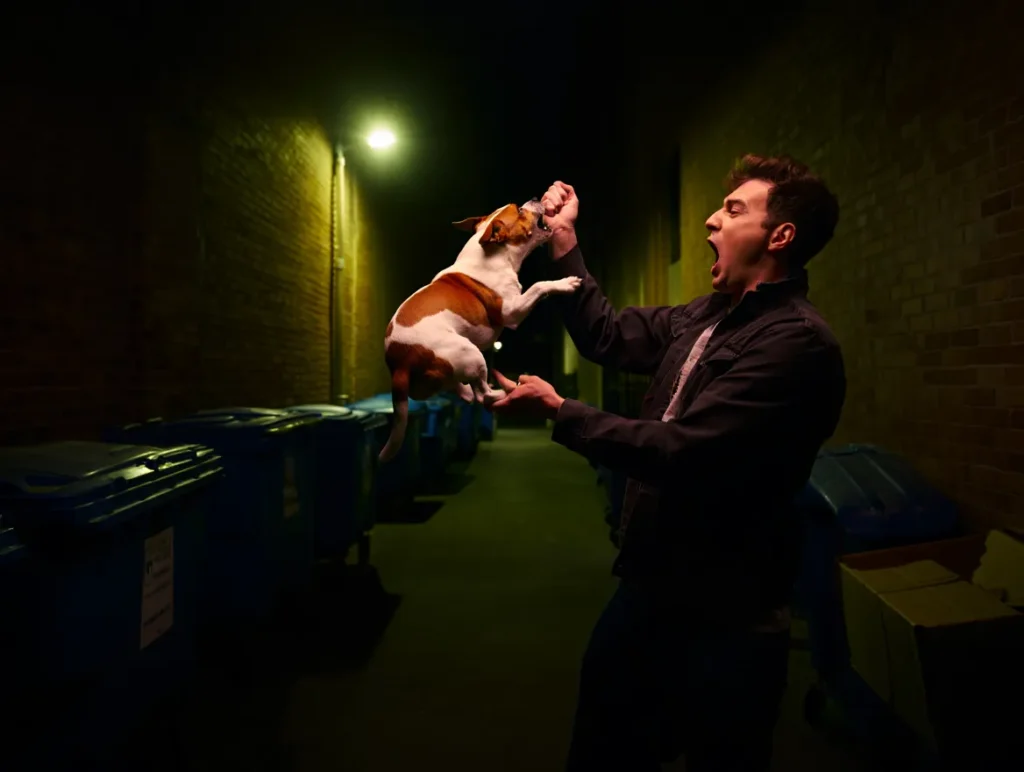
Lucky darted forward like a bullet. The mugger didn’t see it coming. The dog latched onto his arm, teeth sinking into the fabric and skin beneath. The man howled, dropping the knife. It clattered to the ground and spun out in a circle of light.
The mugger twisted, trying to shake Lucky off. That was all the opening Joshua needed. He ran forward, snatched the knife by the handle, and swung hard with the back of it. The handle struck the mugger’s temple with a sickening thud. The man staggered.
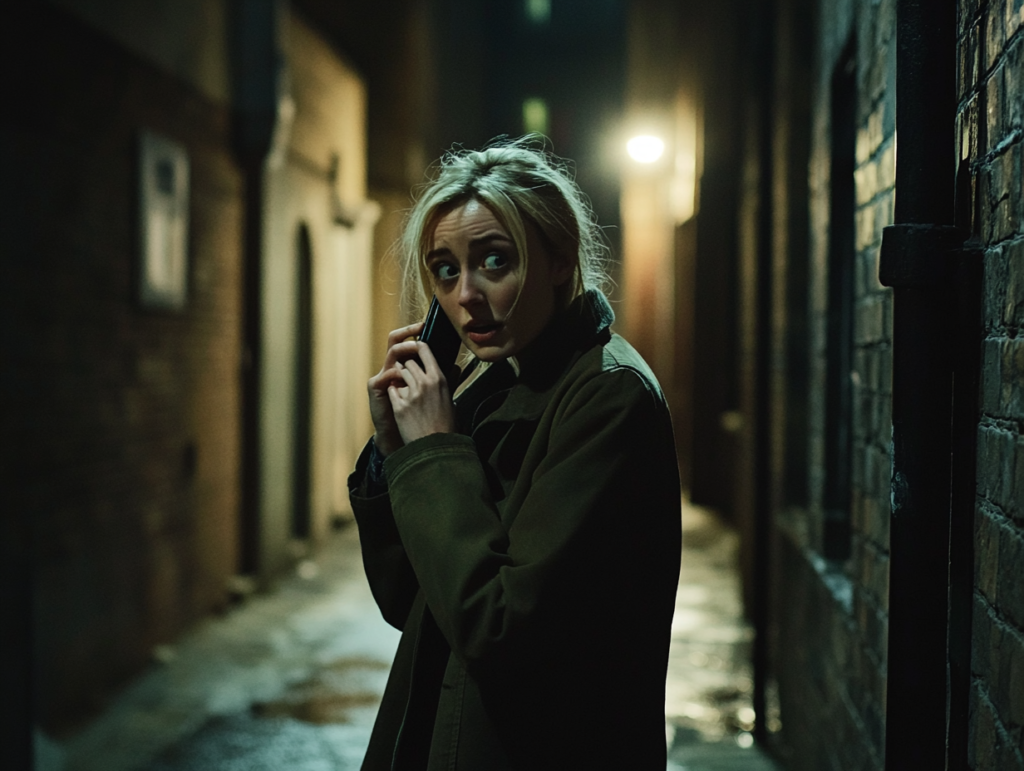
“Call the cops!” Joshua shouted over his shoulder. But the woman already was, voice shaking into her phone. “Yes, I’m at Doyle and Ninth—a man tried to rob me—someone helped me—he had a dog—please send someone fast.” Her fingers trembled, but her voice was clear.
The mugger turned and bolted into the shadows, clutching his head. Lucky barked once and gave a short chase before circling back to Joshua, tail high, breathing hard. Joshua dropped the knife again and crouched to rub Lucky’s side. “Good boy,” he muttered, heart racing.
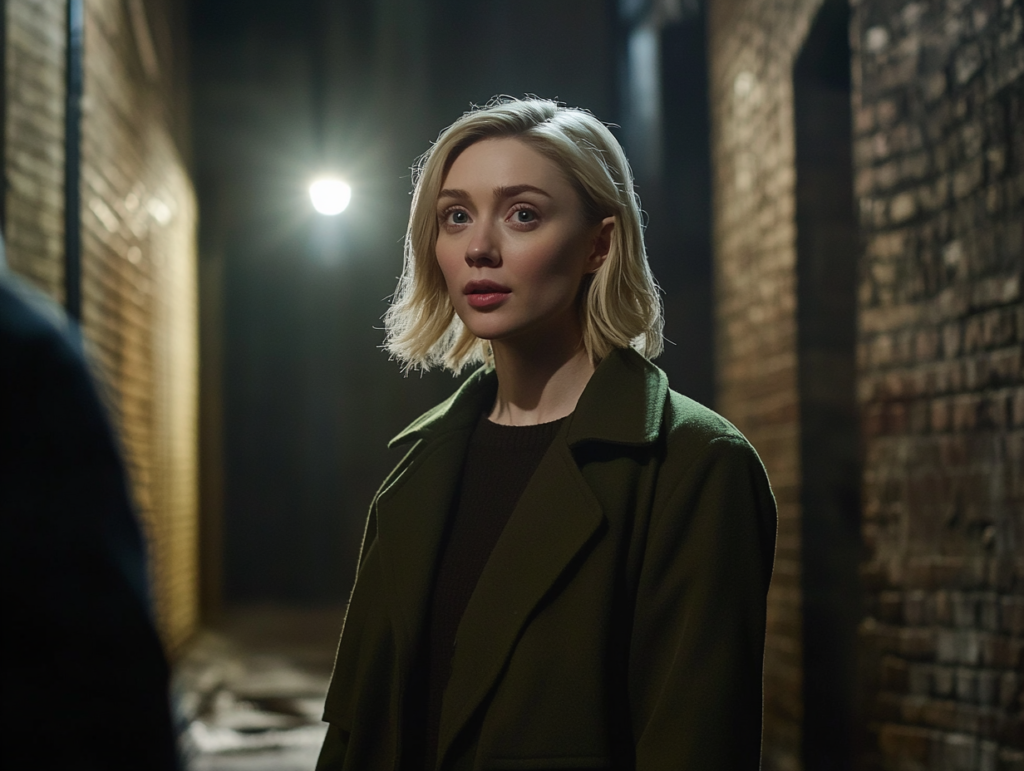
The woman walked over, voice unsteady. “Are you okay?” Joshua nodded. “Yeah. You?” She hesitated, then gave the smallest nod. “Yes… thanks to you.” She looked at Lucky, still wide-eyed. “And him. That was… brave.” Her voice cracked, full of stunned gratitude.
Joshua didn’t reply at first. He just looked at her—really looked. And saw something he hadn’t seen in years. Not fear. Not pity. Respect. For the first time in a long, long time, someone looked at him like he mattered. Like he was something more than what he appeared to be.
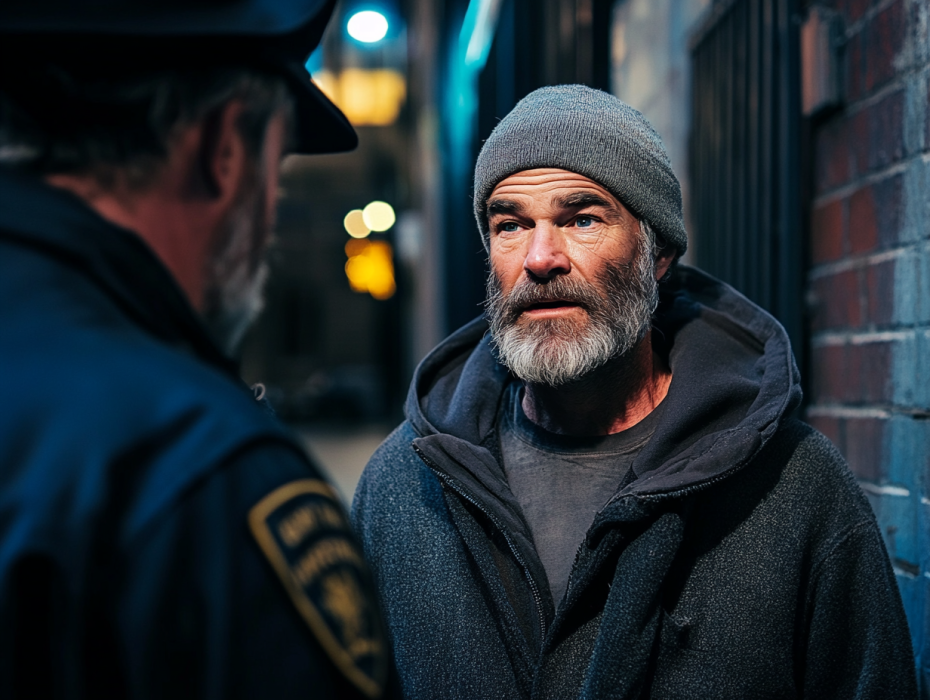
Blue and red lights painted the alley in waves. Two officers arrived within minutes. One checked on the woman, the other turned to Joshua. “You the one who stopped him?” Joshua nodded, suddenly aware of how cold he felt. The officer asked for a statement, and he gave it—clear, simple, nothing extra.
When the officer asked where they could find him, Joshua hesitated. “I’m usually by the old bookstore during the day,” he said. “Just off Hayes. I sit near the side window.” The woman, still shaken but standing steady now, stepped closer. “If I wanted to find you myself… just to thank you?” He nodded. “Same place.”
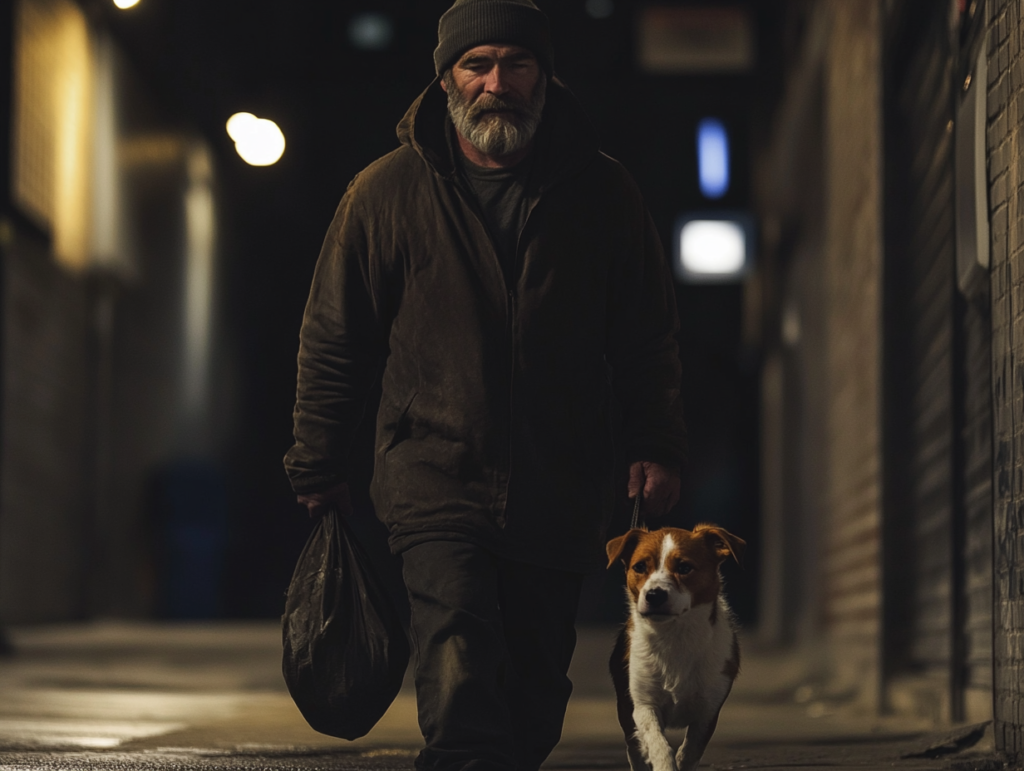
She gave a small smile, eyes lingering. “I will,” she said softly, before letting the officers guide her back to the car. Joshua watched the taillights disappear around the corner. Lucky brushed against his knee, and Joshua gave a small nod. “Come on, buddy. Back to our spot.”
The next afternoon, he was there—seated outside the bookstore, cup in hand, Lucky sprawled at his feet. He hadn’t told anyone. Wasn’t sure what he’d even say. But when a black car slowed and parked across the street, he sat up straighter. The woman from last night stepped out. Followed by a tall man in a crisp suit.
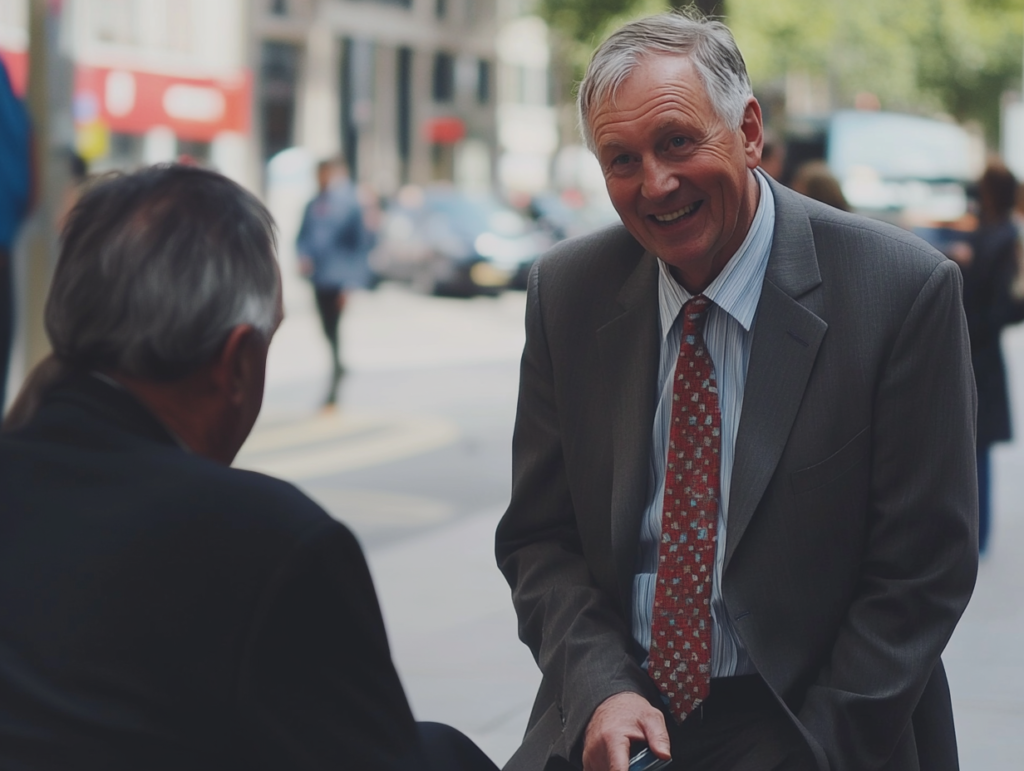
They crossed the street together. “There you are,” Ava said, smiling. The man beside her extended his hand. “I’m Robert,” he said. “Ava’s father.” Joshua stood slowly, uncertain. “She told me how you saved her life last night. You didn’t have to—but you did.”
Joshua shifted, unsure how to respond. Robert continued, more gently now. “Listen. I don’t believe in handouts. But I do believe in second chances. I’d like to offer you a job. Night security at my office. It’s honest work. Comes with a paycheck. And a place for both of you.” He glanced at Lucky, who sat wagging politely.
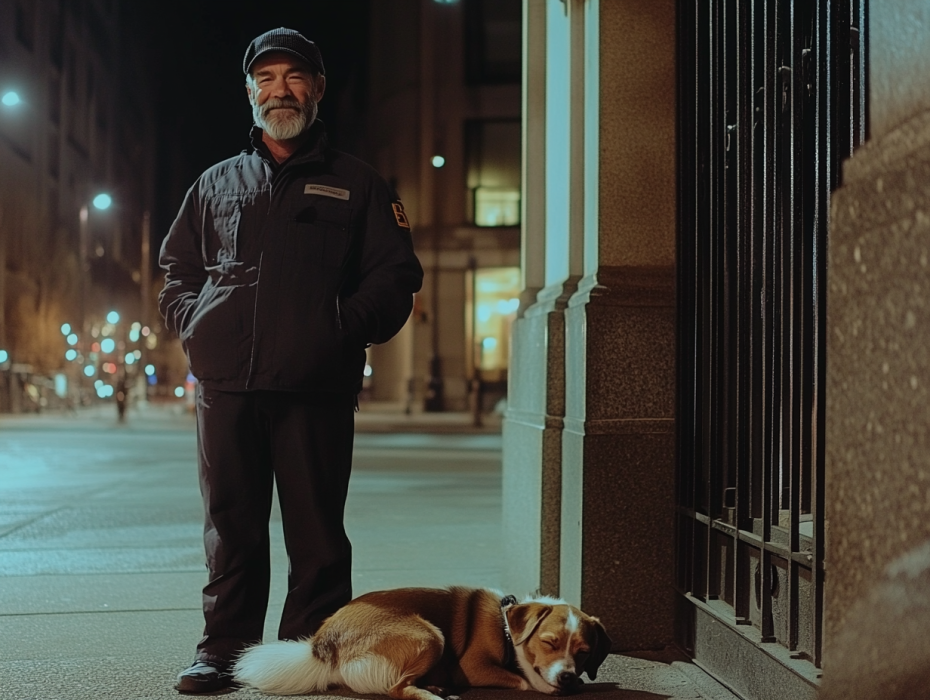
That night, Joshua stood under the streetlamp outside the mayor’s office, wearing a clean uniform, shoulders square. His shoes were still scuffed, but they fit. Lucky sat at his side, a small tag on his collar that read “COMPANION.” For the first time in a long time, the city didn’t feel like it was swallowing him whole. It felt like he’d carved out one small, steady place—and it was enough.
